TOGETHER WE CAN BUILD A NEW IRELAND FOR ALL - BEN COLLINS PAGES 9-11
GERRY ADAMS INTERVIEW - PART ONE PAGES 16-20
ECONOMIC DEBATE ON UNITY - CAOIMHE ARCHIBALD PAGES 32-34 AN FHÓMHAIR 2025 AUTUMN EAGRÁN ISSUE 11


TOGETHER WE CAN BUILD A NEW IRELAND FOR ALL - BEN COLLINS PAGES 9-11
GERRY ADAMS INTERVIEW - PART ONE PAGES 16-20
ECONOMIC DEBATE ON UNITY - CAOIMHE ARCHIBALD PAGES 32-34 AN FHÓMHAIR 2025 AUTUMN EAGRÁN ISSUE 11

The debate around Irish Unity has become more intense in recent months. Almost every day its advocates are setting the political agenda.
SEE PAGE 2
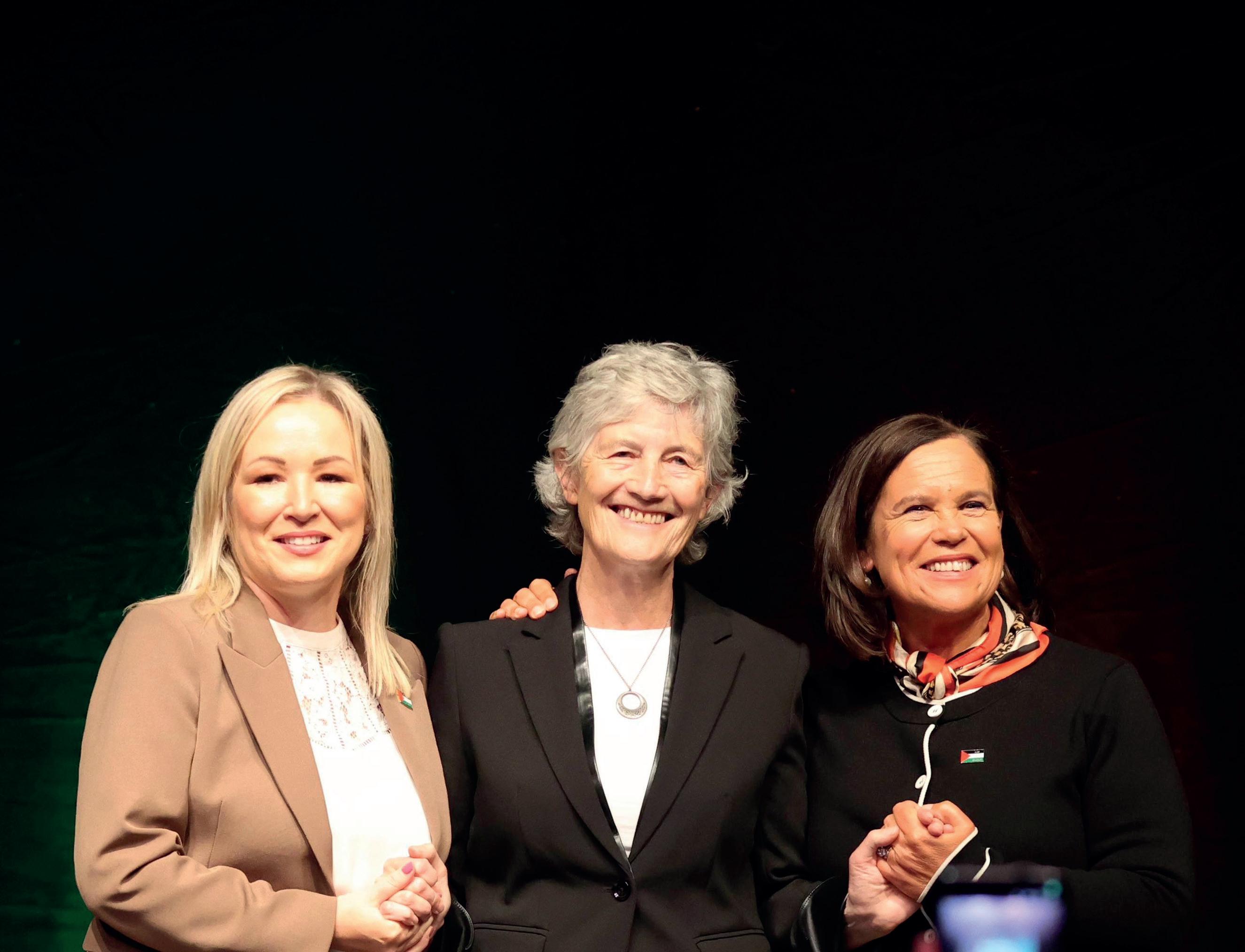


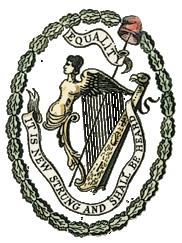
The debate around Irish Unity has become more intense in recent months. Almost every day its advocates are setting the political agenda. This issue has successfully reached this level of conversation despite the British government refusing to set the criteria or a date for the Unity Referendum. It has also reached an unprecedented level of public discourse in spite of the refusal of the Irish government, and in particular An Taoiseach Micheál Martin, to establish a Citizen’s Assembly or Assemblies to plan for unity.
Last summer, the all-party report by the Joint Committee on the Implementation of the Good Friday Agreement concluded its deliberations with: “Preparation for referenda on Irish unification will be a historic task. The Committee calls for preparation to begin immediately.”
Last month Sinn Féin tabled a Dáil motion, calling on the Irish Government to plan and prepare for Irish Unity. Uachtarán Sinn Féin Mary Lou McDonald TD told the Dáil: “I believe that we are on the final length of the journey to reunification. This is a positive and exciting time in our national journey. Inch by inch, we are getting closer to a United Ireland. The conversation on Irish Unity is live, happening in real time with great enthusiasm, especially amongst our young people.”
The motion passed when the government parties did not oppose it.
A few days later Professor Colin Harvey, of Queen’s University, in an article in the Irish Times under the headline; ‘United Ireland debate is increasingly loud – preparation cannot be deferred forever.’ said: “The days of pretending the constitutional conversation is not happening are over. The alert Observer will spot that civic/ political mobilisation is under way.”
Colin Harvey is right and this was most evident during the Presidential election campaign. Catherine Connolly set the pace for this. Irish Unity consequently became a major theme of the presidential campaign. She said: “A united Ireland must also be a shared Ireland - one that cherishes every person, whether they identify as nationalist, unionist or neither. It is not about victory for one side, but partnership between all. … The next chapter of the Irish story will be written together - and I will do all in my power to help bring that future into being.”
The expectation now is that under Uachtarán Connolly the discussion and the impetus toward unity will grow. Responding to the growing momentum toward unity Mary Lou McDonald TD said: “There is an onus on everybody, but particularly on those in political leadership to plan for Ireland’s future. What we need is for the Irish Government to show the same level of engagement and to do the groundwork necessary to build a successful transition to reunification in our time. The government must plan and prepare for unity today.”
BySeánMacBrádaigh
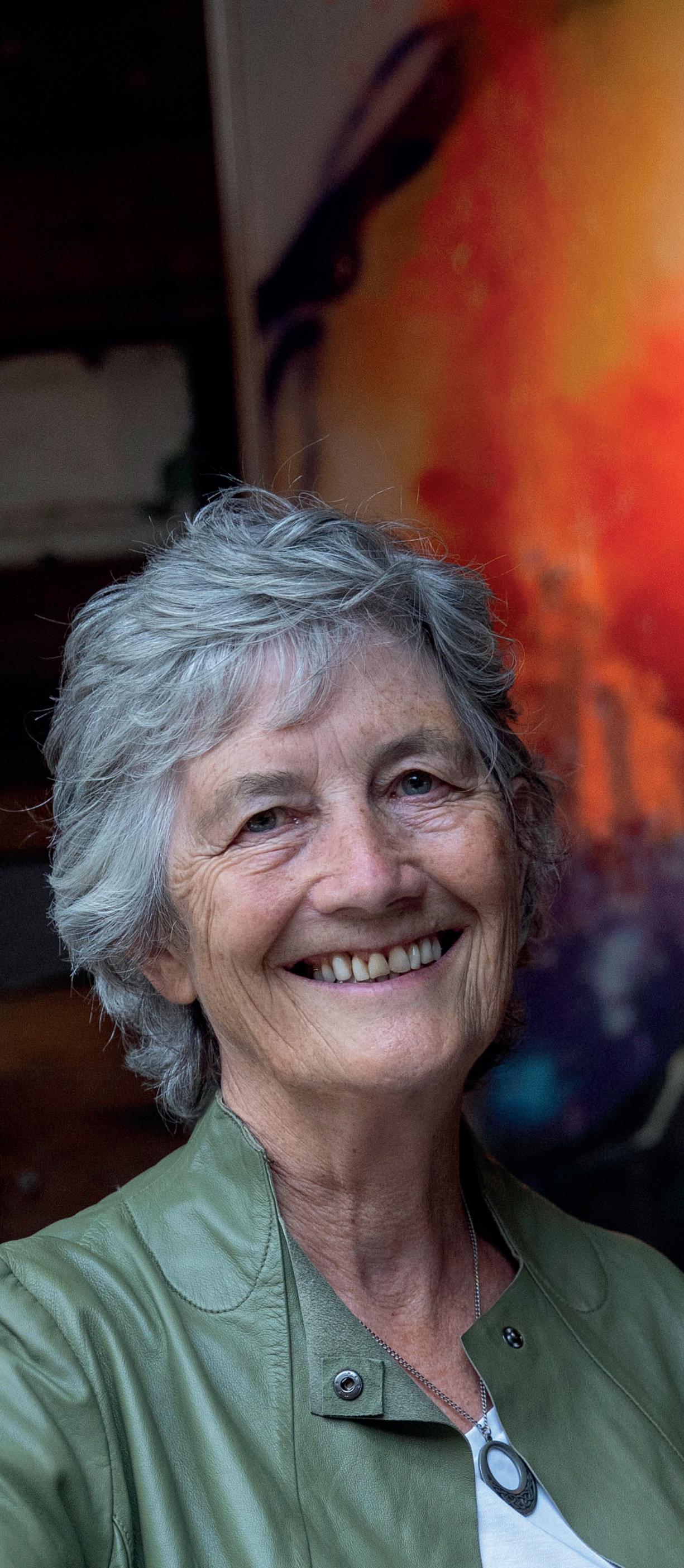
Catherine Connolly’s presidency has re-centred Irish unity as the defining question of our time - and challenged the Irish government to finally prepare for it.
Catherine Connolly’s election as President of Ireland marks a turning point - not just in Irish politics, but in the national conversation about unity.
From the outset, Connolly made Irish unity a key issue. In debates and on the campaign trail, she spoke about unity. Describing the deep national wound of Partition, she said: “We have cut off one of our limbs… This country is too small to be divided, and we need to work towards [unity] with consent and bringing people along.”
She insisted that Irish unity was not a distant dream but a living democratic project, rooted in the Good Friday Agreement. “The Agreement is clear,” she said:
“The people alone will decide our future. We cannot delay, deny or obstruct that right. The Irish and British governments should agree a date for a border poll and begin preparing now to ensure it is inclusive, fair, and respectful of all traditions.”
This was a call for political leadership - for the Irish government to stop deferring history and start preparing for it.
Within days of her election, Connolly kept an election promise: that her first visit on her election would be to the North. She attended the opening of Oireachtas na Samhna – the annual Irish Language gathering - a symbolic and deeply meaningful act. In choosing Belfast, Connolly affirmed that the North is not “somewhere else”, but a key part of the Irish national family. Her visit reflected the growing confidence in a new Ireland - one that recognises that unity will be built through inclusion and respect.
Catherine Connolly’s presence at Oireachtas na Samhna also underscored the cultural dimension of this new phase. The Irish language, long treated as a threat by political
unionism, is now thriving in Belfasta visible sign of how profoundly the North is changing.
The cooperation between Sinn Féin and others on the left - Labour, the Social Democrats, the Greens, and People Before Profit/Solidarityreflected a maturing political moment. It demonstrated that the unity project is also social and economic - about equality, housing, health, and fairness.
This presidential election took place against the backdrop of historic change.
Polling shows the gap between those supporting the Union with Britain and those supporting Irish Unity narrowing dramatically. The recent adoption of a progressive Irish-language policy by Belfast City Council is another marker of how far attitudes have shifted.
Across the island, a younger generation is embracing Irish identity with confidence - free of colonial hangovers that shaped earlier decades. Connolly’s bilingual campaign spoke directly to that generation, and to the sense of a shared Irishness that no longer recognises old divisions.
Sinn Féin’s
Sinn Féin’s role in Catherine Connolly’s victory was central. The party’s involvement gave the campaign scale, credibility, and
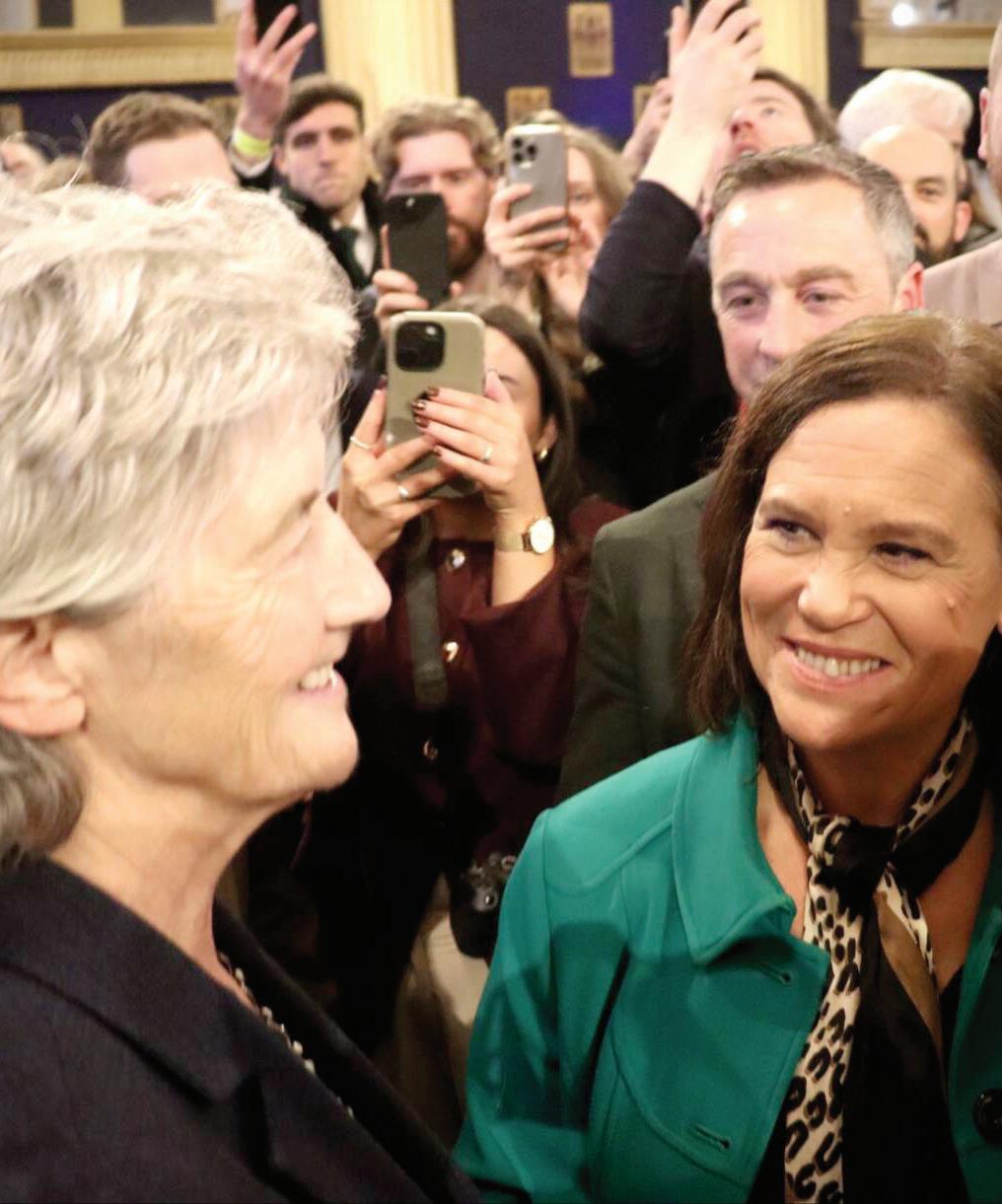
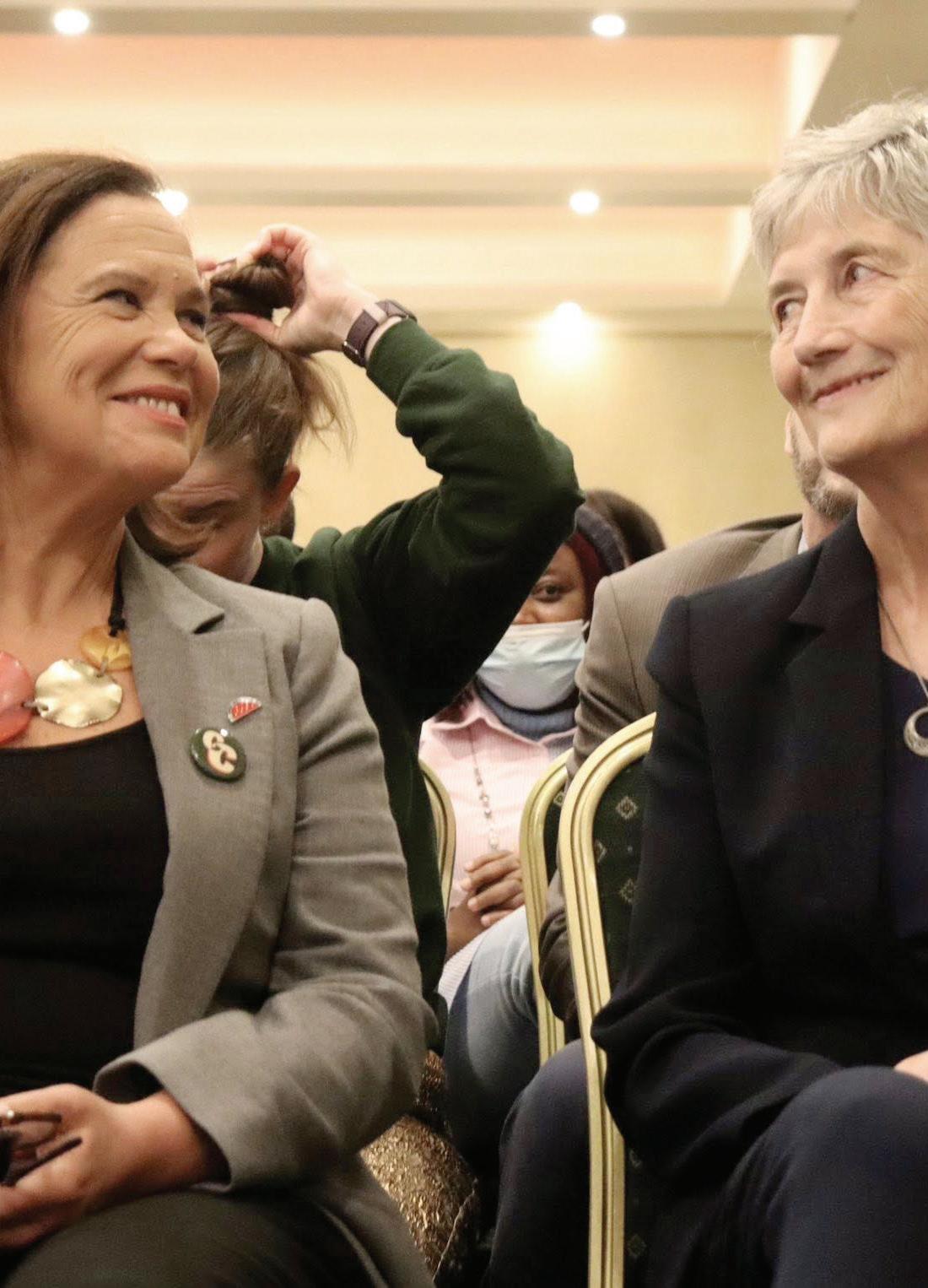
organisation. It brought the politics of Irish unity into the mainstream of the election and ensured that Irish unity was discussed in every debate, every interview, and on every doorstep.
The cooperation between Sinn Féin and others on the left - Labour, the Social Democrats, the Greens, and People Before Profit/Solidarity - reflected a maturing political moment. It demonstrated that the unity project is also social and economic - about equality, housing, health, and fairness.
For Sinn Féin, the campaign’s success has created new momentum for building a broad, inclusive
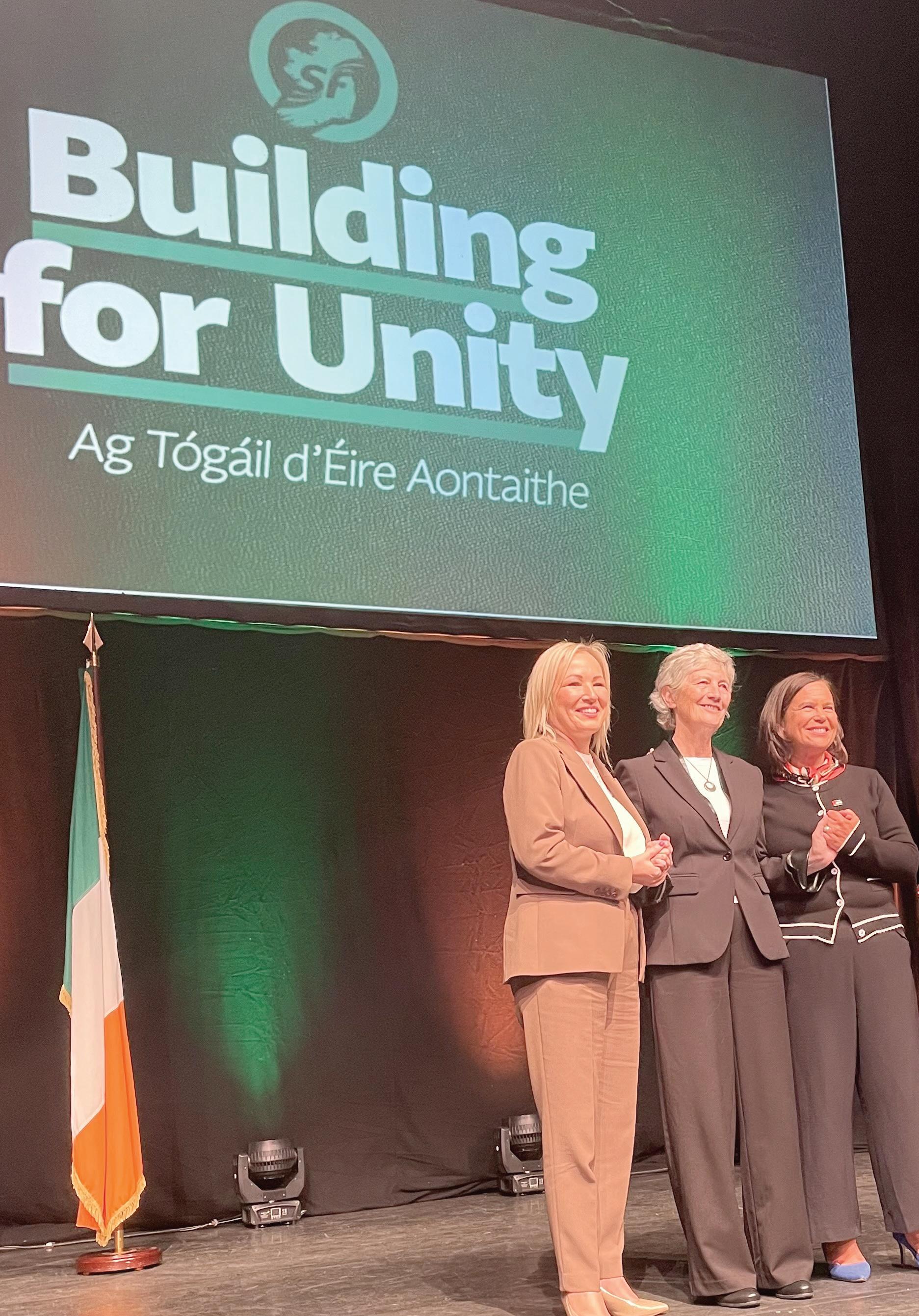
movement for political and constitutional change - one that speaks to every community, north and south.
Catherine Connolly’s clear and principled stance has also exposed the complacency of the current Irish government.
Fianna Fáil and Fine Gael still treat unity as an abstract issue that can be postponed indefinitely. Their refusal
to plan is irresponsible, reckless and an abdication of leadership.
Connolly’s message, by contrast, was one of preparation and inclusion. She called for dialogue, planning, and leadership. Her campaign reminded people of the need to avoid sleepwalking into constitutional change without leadership or a plan.
For that reason, the Irish government must now establish a Citizens’ Assembly on Irish Unity - to allow people across this island to discuss, design, and prepare for the new
Ireland that is emerging.
Future Voices - Guthanna an Todhchaí
During her campaign Catherine Connolly announced a Presidential Initiative, Future Voices - Guthanna an Todhchaí, which builds directly on the vision of the new Ireland which is emerging.
The programme will bring together young people from across the island - from Derry to Daingean Uí Chúisto discuss their hopes for the future of Ireland and to imagine, together, what sharing our common island home could and should look like.
It is an invitation to a new generation to take ownership of the national story.
By grounding her presidency in listening and inclusion, Connolly is helping to democratise the conversation on unity itself - ensuring that the voices shaping tomorrow’s Ireland are those who will live in it.
Unity as a Democratic Imperative
The unity conversation has moved far beyond slogans. It is now about how to build a fair, functioning, and forward-looking all-Ireland democracy.
Catherine Connolly’s victory has shown that the people of this country want that conversation to happen.
Her presidency has made it clear that unity is not just about ending partition - it is about creating a republic that reflects the values of equality, neutrality, inclusion, and social justice.
Irish unity is now mainstream in political debate.
The election of Catherine Connolly has placed it at the centre of Irish public life.
The task for all of us who believe in the republic is to build on that momentum, deepen public engagement, and ensure that the next great act of Irish democracy is a vote for unity.
The conversation about Irish unity has begun in earnest - and this time, it cannot be turned back.
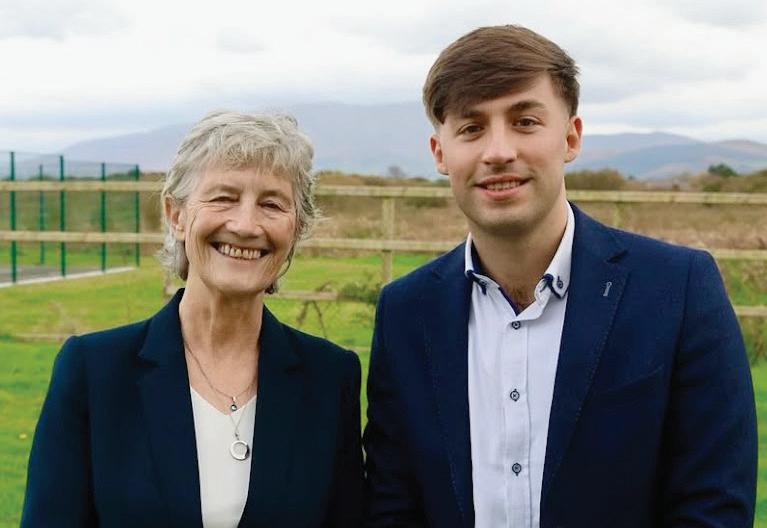
ByDaithíFitzgerald
The recent Presidential election has marked a turning point for youth activism across the Island. For Ógra Shinn Féin, it was not simply a campaign, it was a statement of intent.
It demonstrated the growing confidence of young republicans determined to shape Ireland’s political future and to put the ideals of Irish unity, equality, and social justice at the heart of national debate.
In the months leading up to the campaign, Ógra Shinn Féin underwent a genuine revitalisation. Young members from every part of the island came together to rebuild structures, refocus priorities, and reaffirm shared principles. A landmark gathering in Tí Chulainn, South Armagh, saw activists agree a clear direction for the organisation and identify the values that would guide our political engagement.
Once the Ard Chomhairle made the decision to support Catherine Connolly for president, Ógra Shinn Féin began to mobilise and take the reins of the youth campaign. Through a series of internal meetings, including discussions with Jim Gibney on campaign strategy, Ógra played an active and central role at every level of the effort. Under the Youth for Connolly initiative, members across the island organised, canvassed, and promoted republican values from Belfast for Connolly to Kerry for Connolly, Ógra made sure that Irish unity, the Irish language, solidarity with Palestine, and Irish neutrality were all at the forefront of the campaign.
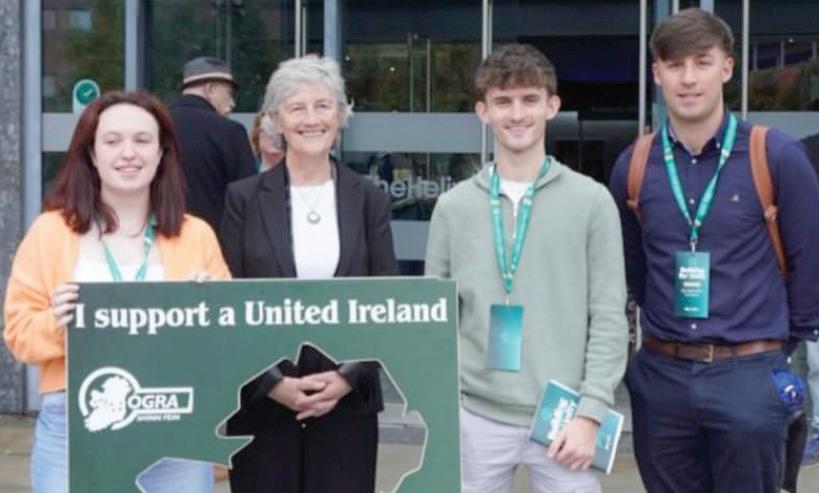
Whether online, on the doors, or at public events, young people drove the message of equality, sovereignty, and hope. The campaign showed that youth engagement can be both principled and effective, and that young republicans are ready to take the lead in shaping the next phase of our journey.
As the election concluded, the sense of achievement was clear. Young people had played a pivotal role, not as bystanders, but as organisers and leaders.
For Ógra Shinn Féin, the task now is to build on that success: to reach out to new members, to sustain the enthusiasm of the campaign, and to prepare for the defining political moment ahead, the referendum on Irish unity.
Daithí Fitzgerald is a member of Ógra Shinn Féin
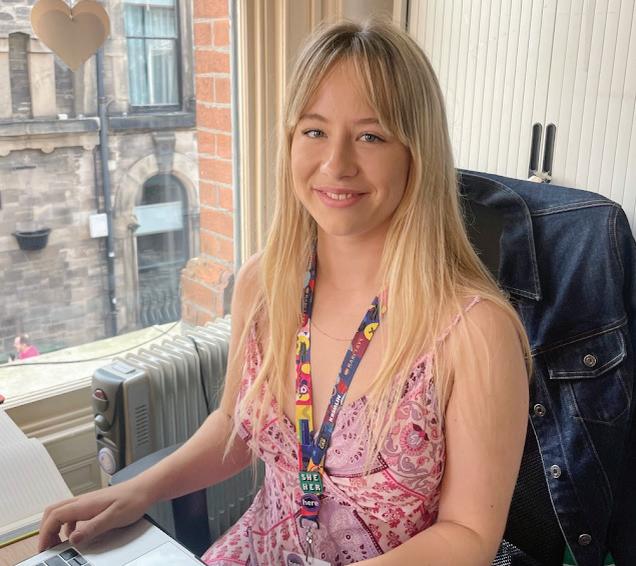
BySophieNelson
MORE WOMEN ARE BEGINNING TO HAVE A VOICE ON CONSTITUTIONAL ISSUES, BUT MANY ARE STILL STUCK IN THE MARGINS. THE BREXIT REFERENDUM PLACED A SPOTLIGHT ON THE ISSUE OF OUR CONSTITUTIONAL FUTURES ACROSS THESE ISLANDS AND WITHIN EUROPE, WHICH SAW THE EMERGENCE OF A RANGE OF CIVIC ENGAGEMENT INITIATIVES TO CONSIDER THE IMPLICATIONS OF THE PROVISION IN THE 1998 AGREEMENT FOR A REFERENDUM ON IRISH UNITY. YET MANY CONSTITUTIONAL CONVERSATIONS REMAIN ROOTED IN DEBATES AROUND ECONOMICS, SAFETY AND SECURITY, FIELDS WHICH HAVE HISTORICALLY BEEN DOMINATED BY MEN, OFTEN LEADING TO UNINSPIRING AND UNREPRESENTATIVE DISCUSSIONS.
While women are sometimes visible in these debates, questions of gender justice and women’s interests are notably absent. In recognising this, women are mobilising North and South to have conversations about our constitutional futures. To involve all women effectively, we must understand that some women face additional barriers to engaging and actively work to dismantle them. Many women remain locked out of constitutional conversations; not least, because there are simply not enough opportunities for women to discuss these issues in shared spaces. There is a lack of investment, despite urgent calls from across the island, to fund this work and
to convene a citizen’s assembly on Irish Unity. Moreover, some women do not want to engage in these discussions; in particular, some unionist and loyalist women are not interested in exploring ideas around a new Ireland or may feel unable to engage due to backlash from within their own communities. Black and minority ethnic women, working class women, disabled women, traveller women or LGBTQIA+ women, who have intersecting identities, all have distinct barriers to participating in constitutional conversations. My work with LGBTQIA+ women, specifically, has led me to understand some of the barriers and possible solutions to engaging with hard-to-
A NEW IRELAND CAN BE DIVERSE, INCLUSIVE AND EQUAL IF WE LOCK IN WOMEN’S PARTICIPATION FROM AN EARLY STAGE; BUT TO DO THIS, WE NEED TO RECOGNISE WHO IS ABSENT FROM THE TABLE AND ENSURE THEY HAVE A SEAT.
reach groups.
In Spring of 2024, I took a group of LGBTQIA+ women to Dundalk to participate in a residential, facilitated by Ulster University and University College Cork through a partnership project called ‘Critical Epistemologies Across Borders.’ The project was devoted to promoting safe dialogue, connecting women across Ireland in political discussions in the context of a changing island.
The LGBQTIA+ women’s charity HERe NI connected with women from LGBT Ireland in a cross-border dialogue exploring the state of healthcare on the island. Women discussed the myths and misconceptions about how healthcare systems operate in respective jurisdictions and crafted a vision for an all-island healthcare model. I learned in that space, that even in the face of political disagreement, women found common ground in a shared LGBTQIA+ identity. This was central to fostering a degree of understanding and trust in the space that allowed women to openly share their vision for new constitutional arrangements.
As conversations developed during the residential, having trusted mediators in the room from the community who held preexisting relationships with the women helped to create a sense of psychological safety. Moreover, keeping a core focus on socio-economic, everyday issues, like access to GP appointments, was not only accessible, regardless of education level, but avoided sliding into heated
debates around referenda. There was also value placed on women’s contribution, as the cost of the weekend was fully covered.
While I work specifically with LGBTQIA+ women, measures such as these could be implemented to engage women from a range of diverse backgrounds in constitutional conversations going forward. Marginalised women need trusted spaces to be able to share their views.
A new Ireland can be diverse, inclusive and equal if we lock in women’s participation from an early stage; but to do this, we need to recognise who is absent from the table and ensure they have a seat. If this can be done effectively, women’s rights could be greatly enhanced in any new constitution. Without it, we risk failing to inspire a shared feminist future for the next generation.
If you are interested in having feminist constitutional conversations, you can get in touch with the Belfast Women’s Assembly, who run a range of events throughout the year to encourage women’s participation in conversations around new constitutional arrangements across these islands and within Europe. You can email NEWSLETTER to belfastwomensassembly@gmail. com to receive our quarterly publication.
Sophie
Nelson, Senior Policy Development Officer at HERe NI & Belfast Women’s Assembly Steering Group Member.


ByBenCollins
For me Irish Unity is about more than reclaiming the fourth green field, while that is important. It is also about the better quality of life which I believe everyone across Ireland will get through reunification. There is so much more which we can achieve together, than we can apart. I come from a strongly Unionist and British background but have always considered myself to be Irish. Initially this was in addition to being British but gradually living in Britain made me feel more Irish and less British. During the conflict I was determined that I was not going to be forced into a United Ireland by violence or threats of violence. But the Good Friday Agreement changed all that.
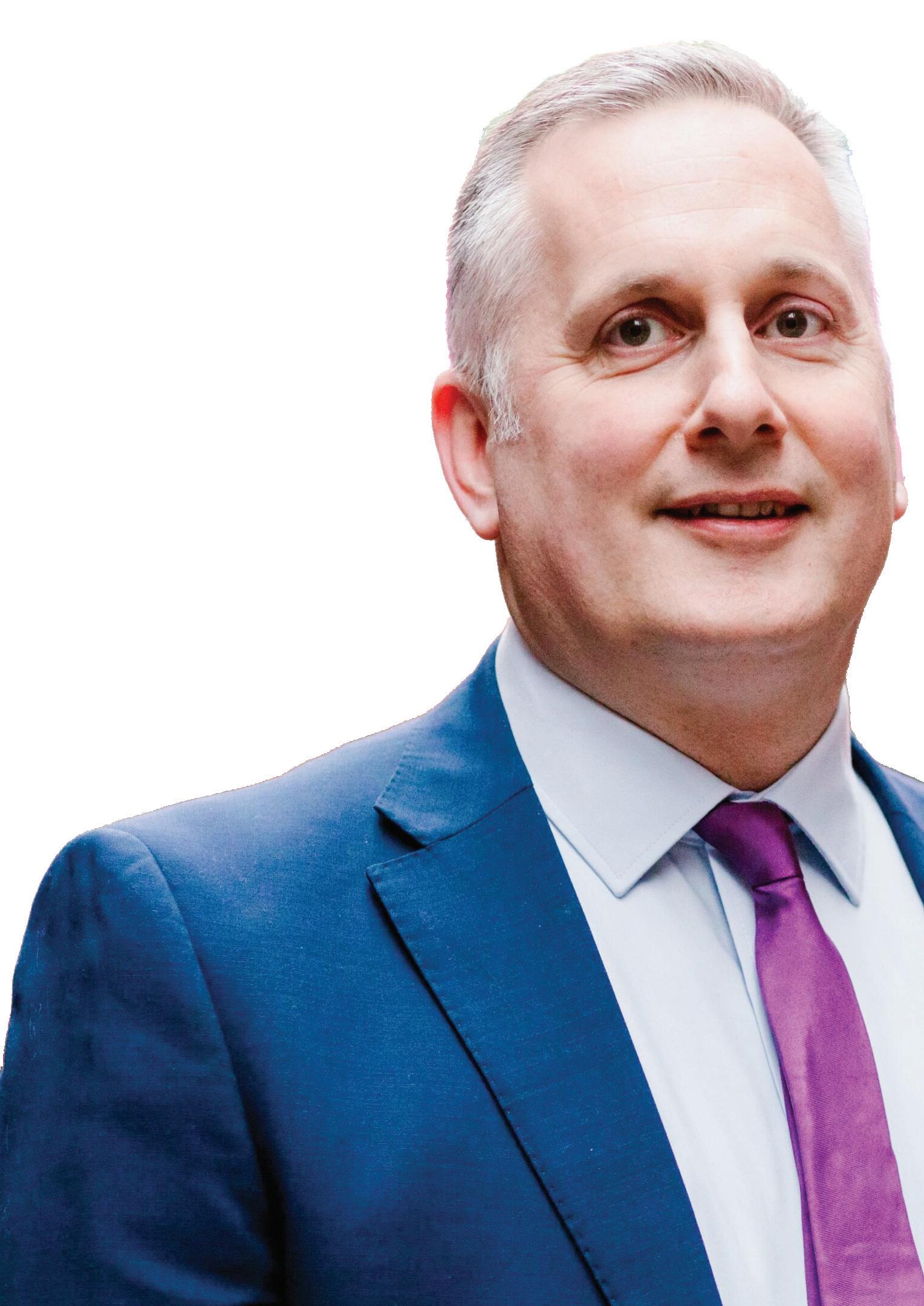
For the first time I could consider a different future and it seemed logical to me from that point on that there could be a peaceful reunification of our country. I worked in Scotland for 4.5 years and during that time, at the SNP conference of 2002, I heard their party talk about the benefits of fiscal autonomy. This really resonated with me and I realised that the best way to control finances was through full independence from London.
In 2012 I decided to write a book on how there could be a pluralist United Ireland with Protestant, Catholic and Dissenter living together. The United Irishmen and women provided a way forward. It struck me as fitting that the Good Friday Agreement of 1998 could finally enable the unity of the island which had been sought in the rebellion of 1798.
So, for me Irish Unity is about identity and bringing everyone across the island together. But it is also about quality of life. The North was taken out of the EU as a result of the Brexit referendum by the votes of those living in England. A United Ireland in the EU will lead to better outcomes for everyone. Across multiple metrics the South is performing better than the North. People in the South can now expect to live for two years longer than those in the North. Educational attainment in the South is the highest in Europe, whereas in the North it is significantly lower.
too long people in the North have left because they believed they had to go elsewhere for opportunity. I am the youngest of three brothers and the only one who still lives in Belfast. There is nothing wrong with people seeking opportunity and adventure elsewhere. What is deeply concerning, is the thought that people leave Ireland because they believe that they cannot succeed at home, despite wishing to do so.
I firmly believe that reconciliation can only be achieved through reunification. In that way we can achieve our full potential. It also means that we can work together as one island, as one country with one parliament.
My book ‘The Irish Unity Dividend’ sets out that we need to plan and prepare in advance of the border poll which is coming. We need to go for an integrated form of governance to secure fully the many benefits from reunification. There is no such thing as a kinder gentler form of partition.
We have started to see the development of a truly all-Ireland economy but there is more which can be done through reunification to break down barriers. The South will benefit from an increase in capacity when unity happens. For
Now that Catherine Connolly has been elected as President of Ireland it can be hoped that she will use her office to start discussions on planning for unity. Nobody should have anything to fear from a conversation about our future. The momentum for change won’t just come from Ireland itself. There are changes happening across Britain as well. The SNP continue to be a resilient party of pro-independence in Scotland and a recent opinion poll shows 55% in favour of independence. The SNP and Greens are forecast to produce a clear pro-independence majority at next year’s Scottish Parliament elections. In Wales Plaid Cymru, the party in favour of independence, is leading the polls and appears on course to be the largest party in the Senedd after the elections in May 2026.
The fragmentation of the political landscape in Britain is also leading to the collapse of support for the Labour party and the Conservatives. We
are also seeing surging levels of support and membership growth for the Green party in England and Wales which supports both Scottish and Welsh independence. Northern Ireland was created as a region to have a permanent Protestant and Unionist majority. It now has neither. But I think the change will be driven from within Ireland by people from all backgrounds who recognise that partition has failed us all. After the Good Friday Agreement, the North got a peace dividend and the South got an economic dividend. Nearly thirty years after the people of Ireland voted for this agreement, it is time that we should get to vote for the next stage of our island’s reconciliation.
I firmly believe that reconciliation can only be achieved through reunification. In that way we can achieve our full potential. It also means that we can work together as one island, as one country with one parliament. This is how we can best protect ourselves against future pandemics, by taking one approach, rather than two at times contradictory approaches which happened during the COVID-19 pandemic. We can deliver much needed housing through an integrated all-Ireland approach, where housing associations and approved housing bodies can leverage their assets to deliver across Ireland without the barriers caused by partition.
I believe in immigration, that it is a good thing and that we also need to take our fair share of refugees. But I know that there are some people who have genuine concerns about this. Irish unity will make it much easier to manage immigration as we will be able to do using our sea and airports. There will no longer be a British border on the island of Ireland which has been used by successive British prime ministers to attempt to game the system. We saw this most recently with Rishi Sunak boasting that his Rwanda Scheme was encouraging refugees to go through Britain, through the North and on into the Republic. By being seen to manage immigration effectively, the government will lessen the ability of the far right in Britain, the USA and within Ireland, to sow dissent across our island.
Irish Unity ultimately is about peace and prosperity. There will be an opportunity for Unionists to play their part in this. As Mike Nesbitt, leader of the Ulster Unionist Party said at his conference recently, Unionists could hold the balance of power in an all-Ireland Dáil. Westminster has been a cold house for Unionism, as there hasn’t been a Unionist MP from the North in the British Cabinet since the Second World War. That’s 80 years outside the corridors of power. Instead let’s bring Unionism into the Irish political mainstream and together we can build a New Ireland for all.
Ben Collins is a writer and communications consultant from a Unionist and pro-British background in East Belfast, who now believes in Irish Unity. He is the author of two books
The Irish Unity Dividend and Irish Unity: Time to Prepare both published by Luath Press.
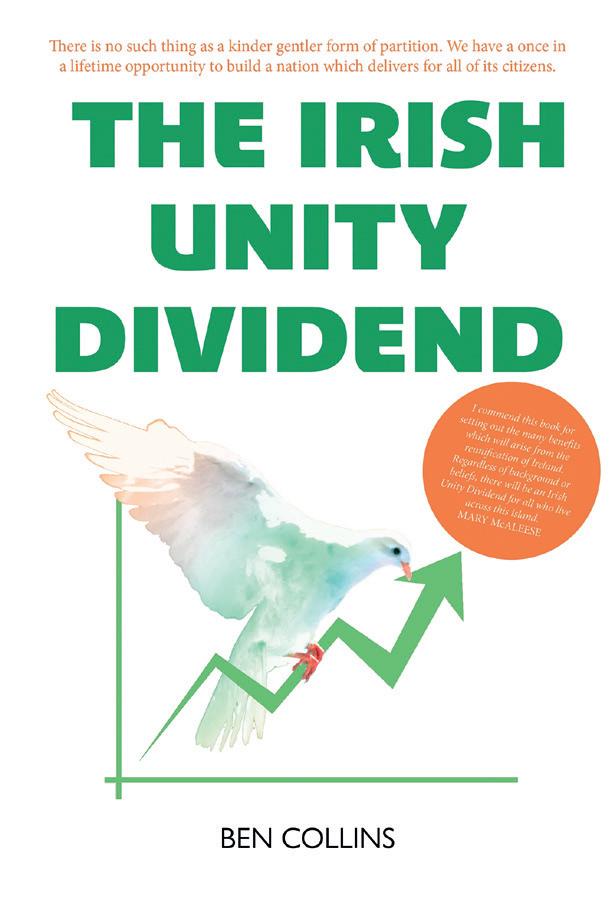
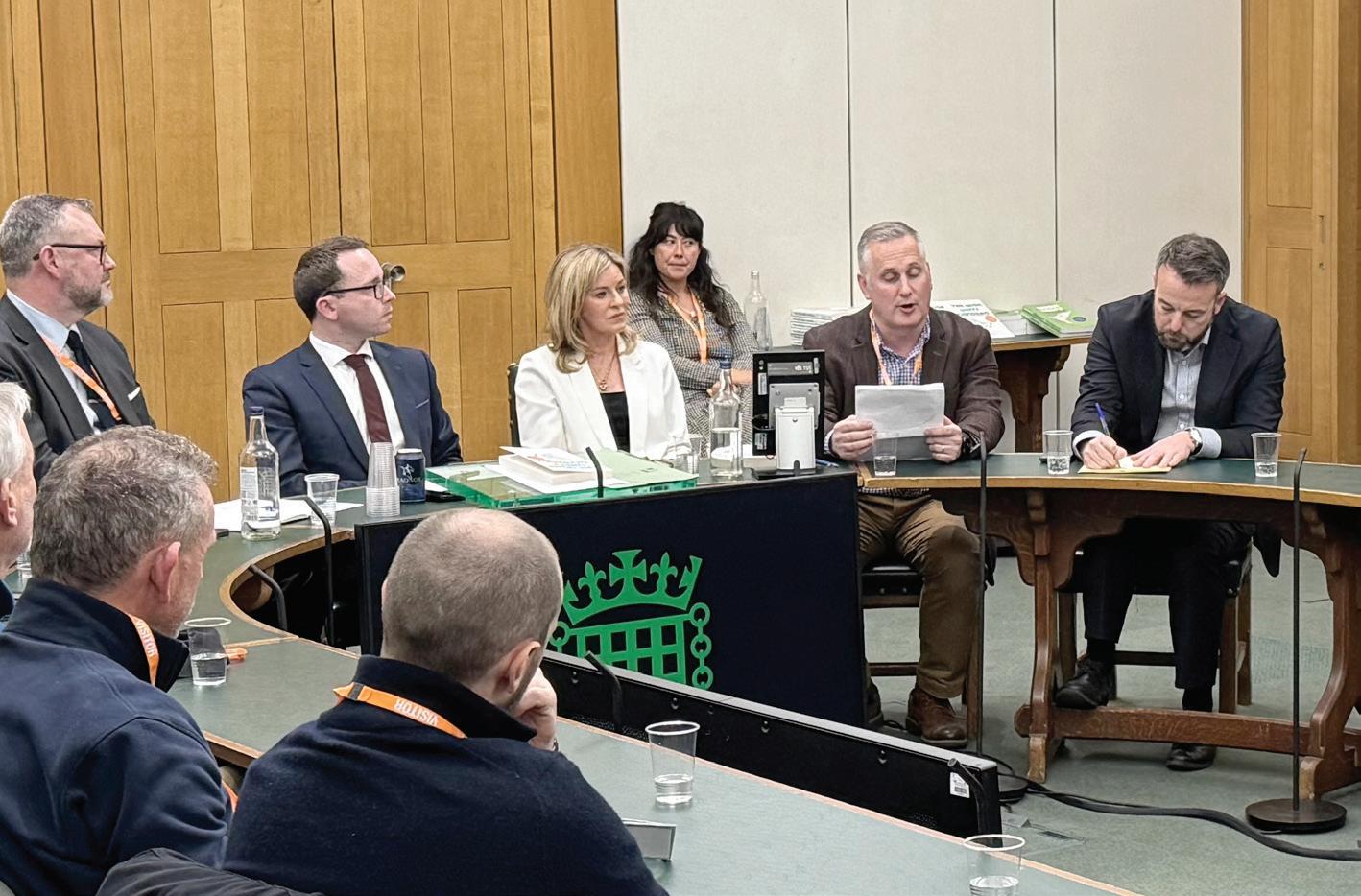
ByMartina Anderson
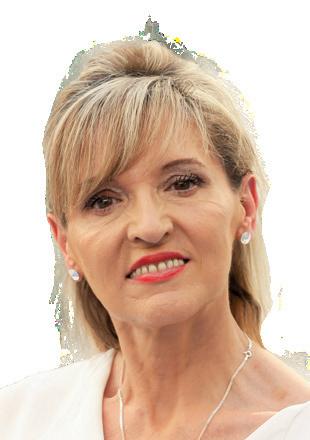

2026 marks ten years since the Brexit referendum. The consequences of that reckless Tory project are clear for all to see. What was born as an internal Conservative Party quarrel became one of the greatest political and economic miscalculations in modern British history.
From the outset, there was no preparation, no plan, and no concern for the wider consequences. David Cameron gambled with people’s futures, misjudging both the role Nigel Farage would play and the poisonous lies that would be peddled on the side of a red bus – promising that leaving the EU would deliver millions more for the NHS. It was never true.
But the most glaring omission of all was Ireland. At no point did the architects of Brexit take account of the Good Friday Agreement. At no point did they consider how ripping Britain out of the EU would impact this island – its peace process, its people, and its economy.
When the then Taoiseach of Ireland, Fine Gael’s Enda Kenny, went to the first EU Council meeting immediately after the referendum, he raised concerns about… “Scotland.”
At that meeting he never mentioned Ireland nor the Good Friday Agreement. And when Fianna Fáil leader Micheál Martin took the reins of power, he too carried on that same line of dismissal. In New York recently, rather than championing the democratic provisions of the Good Friday Agreement, he chose to attack Sinn Féin for having the audacity to raise the conversation about Irish unity in the aftermath of Brexit – as if discussing the future of our country was some reckless indulgence rather than a legitimate political project. Instead of providing leadership and preparing for the change that Brexit has already accelerated, successive Taoisigh have preferred to lecture republicans while abdicating their own responsibility to plan for Ireland’s future.
Sinn Féin took a different path. The Sinn Féin MEPs embarked on a determined diplomatic offensive, politically supported by Martin McGuinness. We lobbied across the European Parliament and EU Commission producing even a pocket-sized Wee GFA booklet to explain the significance of the Agreement, its obligations, and its
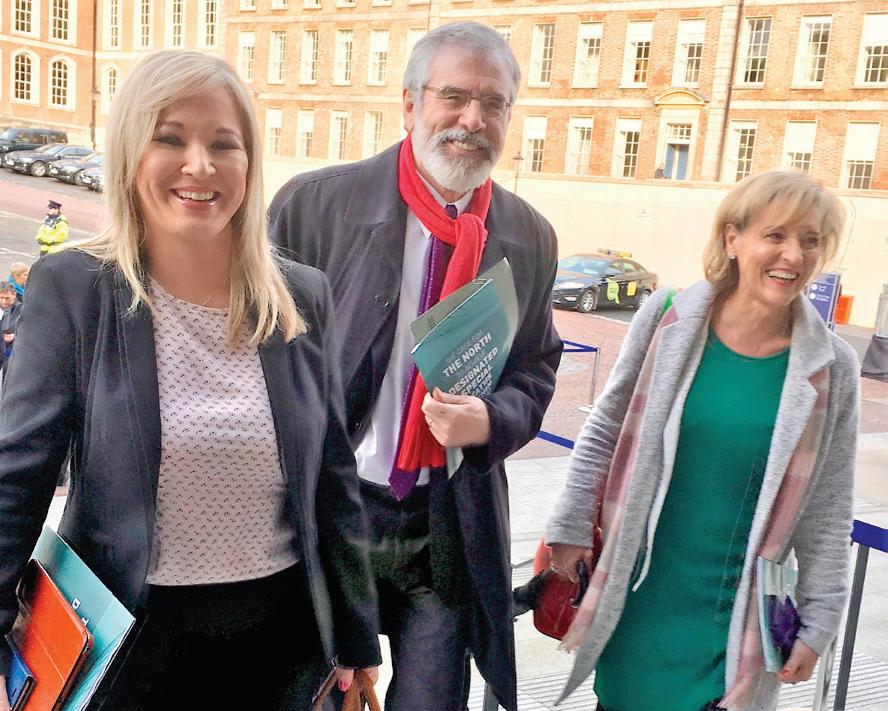
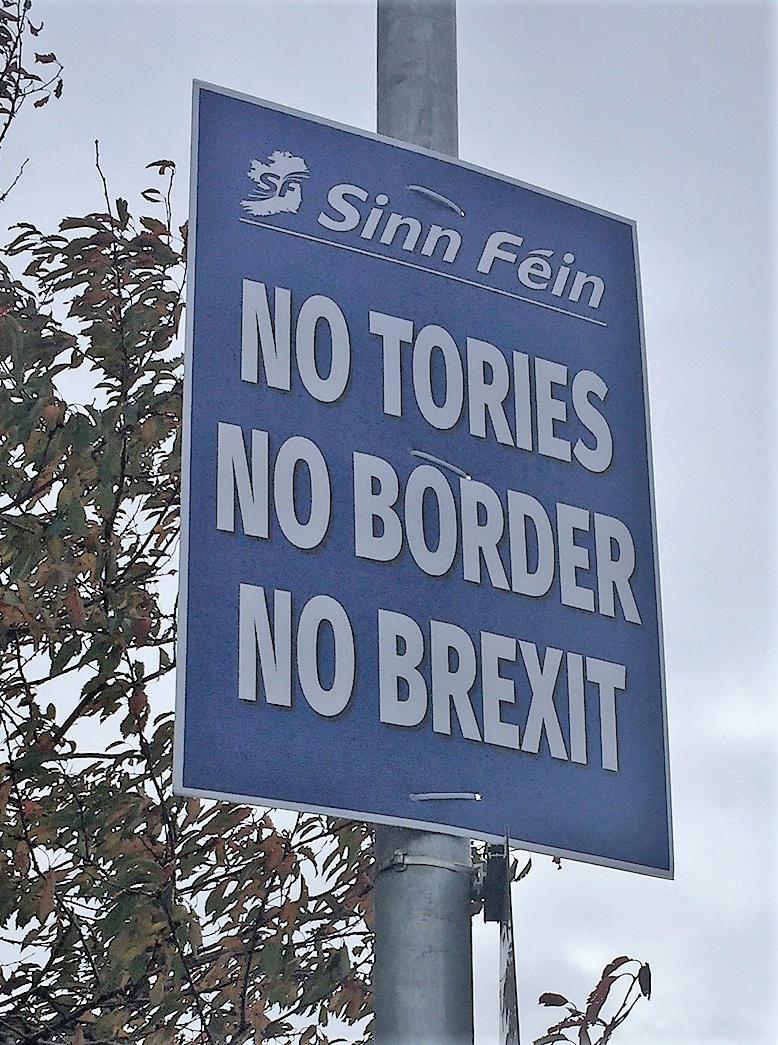
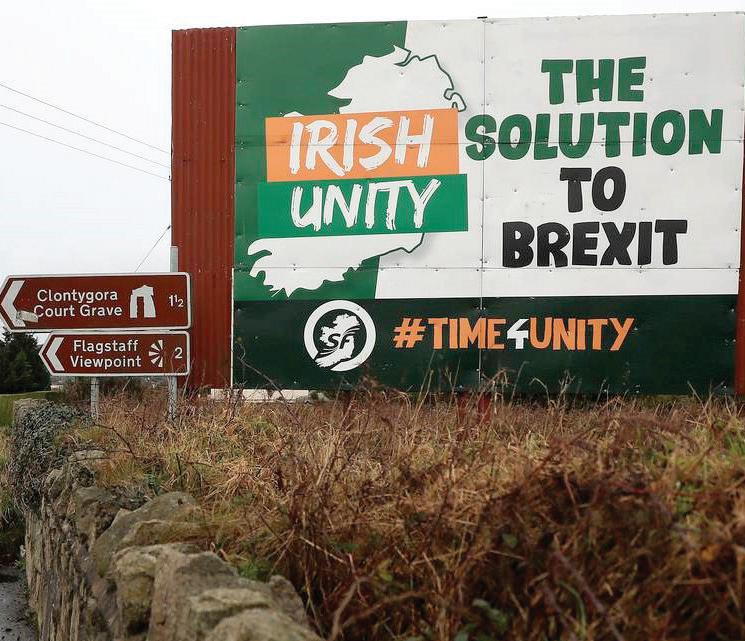
protections.
We argued that all of Ireland needed to remain within the European Union – not because the Union is perfect (it requires serious reform), but because Brexit posed existential risks to the Agreement. It was however an uphill battle. Some MEPs from the Irish Government’s own group – Fine Gael, suggested a Swiss-style border across Ireland, reinforcing partition. We were clear, concise, and when required, bold. I told Theresa May directly to stick her border where the sun doesn’t shine – and Europe took notice.
Our persistence paid off. We secured majority support in the European Parliament for the principle that there would be no hardening of the partitionist border, that the Good Friday Agreement would be protected in all its parts, and that the all-Ireland economy would not be damaged. The Council concurred. Later, the European Council itself confirmed, that in the event of Irish reunification, the whole of Ireland would automatically remain in the EU.
The DUP believed that Brexit would reinforce partition. Arlene Foster spoke of “blood red lines,” declaring the party’s absolute refusal to accept any deal that created regulatory or customs differences between the North of Ireland and Britain.
Yet the reality is that a border in the Irish Sea has existed for decades, with long-established regulatory and customs differences already in place. Meanwhile, Conservative MP Jacob Rees-Mogg pined for Britannia to wave away the rules and disregard existing agreements, ignoring the fact that businesses in the North trade more with the South than with Britain, and that our Assembly is anchored in EU law to ensure compatibility with European frameworks.
The Good Friday Agreement is sacrosanct. Its Strand Two explicitly states that all-Ireland co-operation must consider the EU dimension of policies and programmes. Brexit was simply incompatible with the Agreement. The damage of Brexit is now undeniable. Britain faces higher inflation than any major economy, slowing growth, and mounting pressure on household budgets. The OECD projects inflation of 3.5% by the year’s end 2025 – up from 2.5% last year.
Brexit has not only undermined trust but fundamentally altered the context of British-Irish relations. The Tory drive to centralise power in Whitehall has further weakened the devolved institutions in the North, in Scotland, and in Wales.
Yet, from these fractures has emerged something powerful: a new, exciting conversation about constitutional change and Irish unity. Momentum is growing. Several Economists like Professor John Doyle, Vice President for Research in Dublin City University, have made the case for Irish reunification which has been clear and compelling “there are no economic barriers to Irish Unity”.
Their assessment showed that the real obstacles are political will and planning, not financial viability.
In fact, many have argued that unity could unlock economic opportunities across the island, creating a more efficient, fairer, and prosperous economy. The Good Friday Agreement provides the democratic mechanism for that change: concurrent referendums, north and south. The people of the North voted to remain in the EU. Through unity, the whole of Ireland would remain in the EU.
Those of us who advocate for unity must set out a clear, persuasive vision of the new Ireland.
That means:
• Demonstrating the economic and fiscal benefits of reunification.
• Guaranteeing services such as a national health service in Ireland, free at the point of delivery.
• Building a pluralist, multicultural, rights-based society with reconciliation at its core.
We must also recognise and address unionist concerns. Political unionism has weaponised the Protocol, now called the Windsor Framework, to mask their own failures of leadership. But the reality is that the North’s economy, its political landscape and social well-being stands to benefit from Irish reunification.
Unionism is not a monolith. Some in civic unionism are already engaging in dialogue, pragmatically acknowledging that change is coming. Wallace Thompson, a founding member of the DUP, has said
that unionists must prepare strategically for Irish unity, arguing that some form of reunification is inevitable.
The Irish Government has a crucial responsibility. As co-guarantor of the Good Friday Agreement, it cannot sit idly by or repeat the mistakes made by the British Government in 2016. London held a referendum without planning, without preparation, and without informing the public of the consequences. That recklessness cannot be repeated in Ireland. Dublin must begin preparing now for a unity referendum so that people are fully informed, engaged, and confident about their choices. The first step should be the establishment of a Citizens’ Assembly or Assemblies on Irish Unity – a forum where voices from across our island can examine the issues, address concerns, and help shape a clear, shared vision of the future.
Every voice must be heard - republican, unionist, nationalist, loyalist, and those of none of these traditions. A dedicated Citizens’ Assembly or Assemblies on constitutional change would provide the forum needed for inclusive, grounded discussion.
Our approach must be about inclusion, not marginalisation. For our part, republicans will be sincere and generous partners in pioneering this path forward. We will work with all sections of society – and especially with our unionist neighbours – to build a new, agreed Ireland.
As we look back approaching its tenth anniversary, Brexit was an unmitigated disaster – reckless, ill-conceived, and destructive. But in its wake, it has opened a pathway. The dynamics of constitutional change are in plain sight. A decade after the BREXIT referendum, we stand at a historic juncture, and we must plan and prepare for an Irish unity referendum in the not-too-distant future -2030.
The Good Friday Agreement is our anchor. It offers us the peaceful, democratic route to reunification and re-entry into the European Union. Ireland’s future is ours to shape: a new Ireland that is inclusive, reconciled, human rights compliant and democratic to its core – and it’s the duty of every Irish republican not to lose the moment we are in.
Martina Anderson is a former Sinn Féin MEP and is National Training and Political Development Coordinator for Sinn Féin.
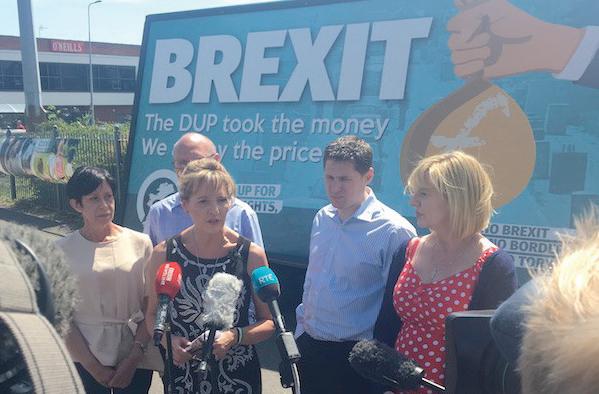
1. Two Presidents were born outside of Ireland. Who were they?
2. Which President was married to two sister?
3. Another President also married twice. Who was he?
4. Whose presidency was the shortest?
5. Which Fine Gael Minister politely described President Cearbhail Ó Dálaigh as ‘a thundering bollocks and a fucking disgrace’ for referring a repressive government bill to the Supreme Court?
6. After the Taoiseach refused to accept Donegans resignation, President Cearbháil Ó Dálaigh resigned after only 20 months in office. Who was the Fine Gael Taoiseach?
7. Two Irish Presidents have resigned from office, one being Cearbháil Ó Dálaigh. Who was the other?
8. Which two Presidents had, on their CV, the achievement of having escaped from prison?
9. Five Presidents have been elected unopposed - who were they?
10. Which two presidents had fathers who spent time in prison?
11. A person can be nominated to run for president in three ways - by the support of 20 members of the Oireachtas; by receiving four Council nominations, or by a sitting or former president ‘self nominating’. Which four presidents have exercised that power?
12. Two presidents had ‘dodgy’ birth certificates who were they?
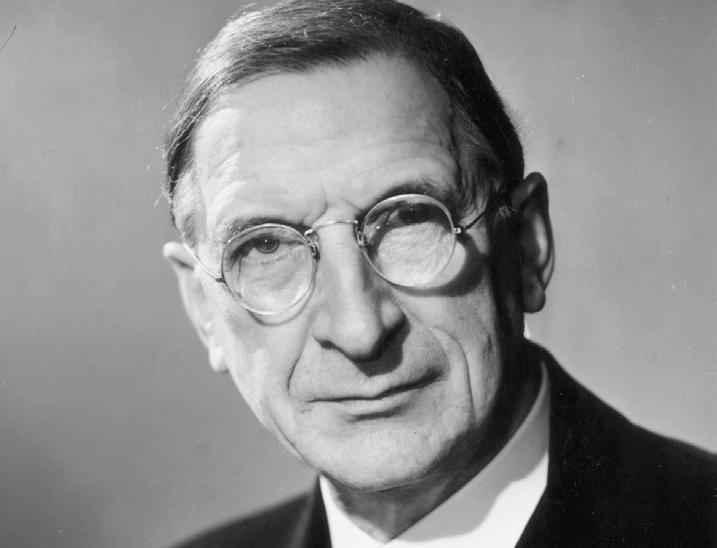


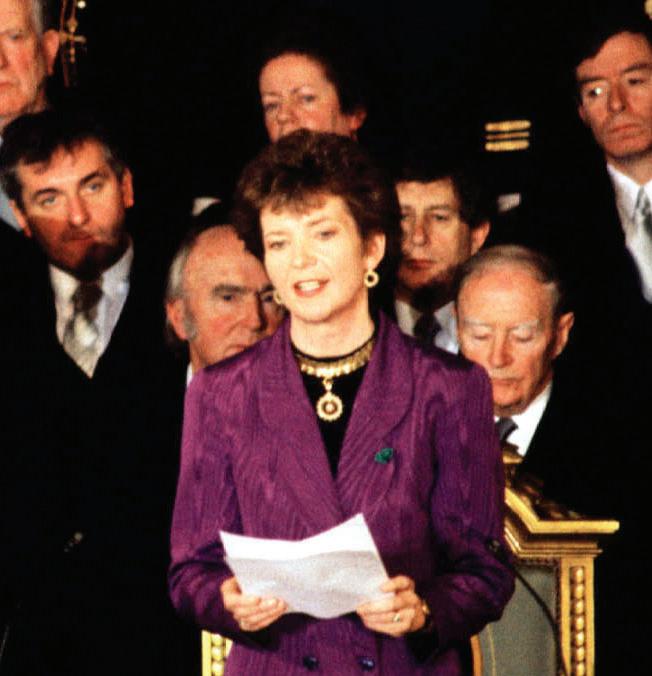
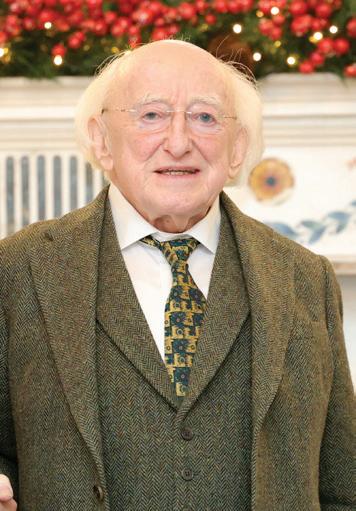
1 2 3 5 8 7 6 11 11
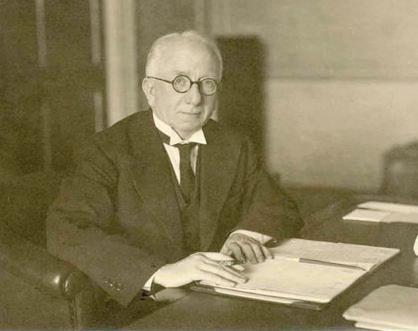

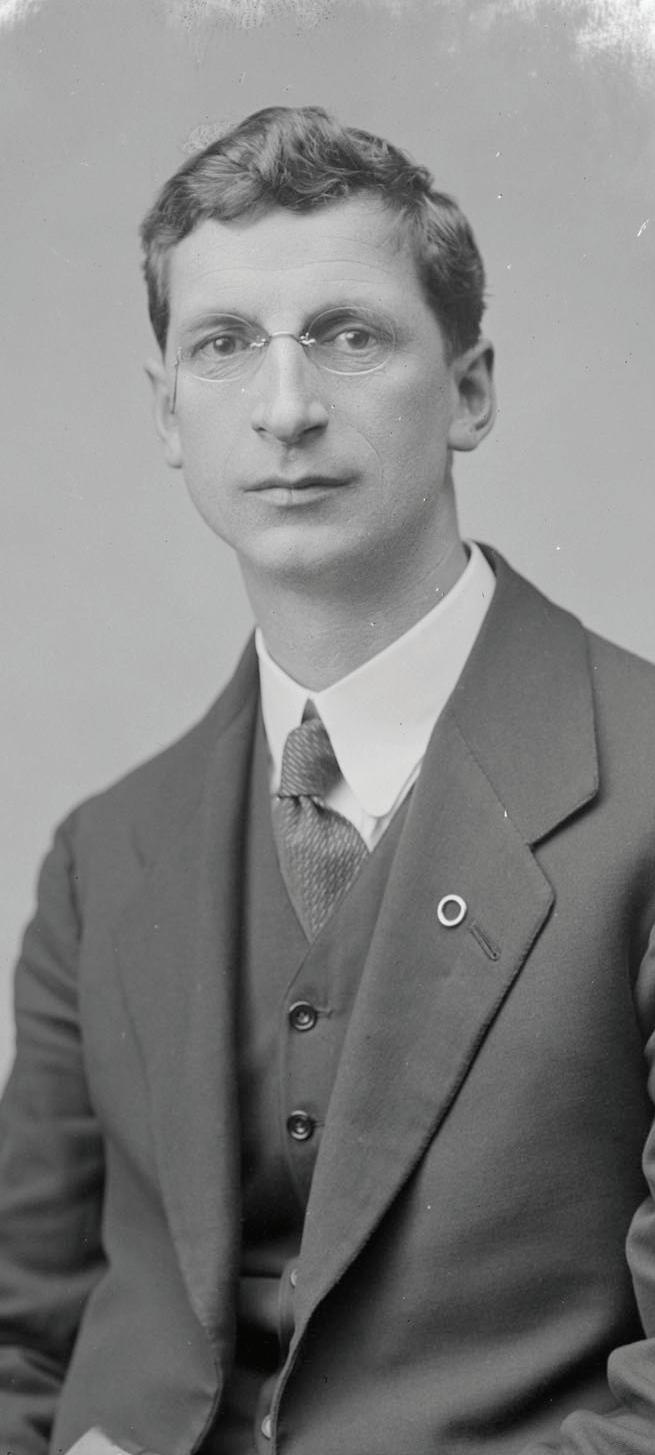
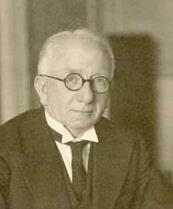
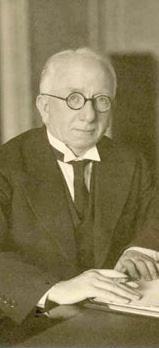
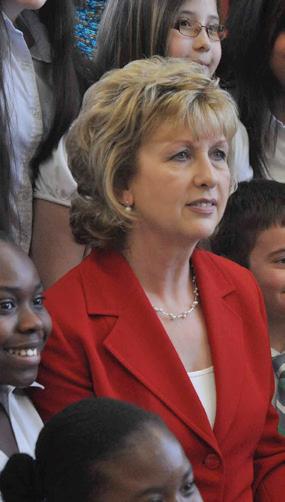
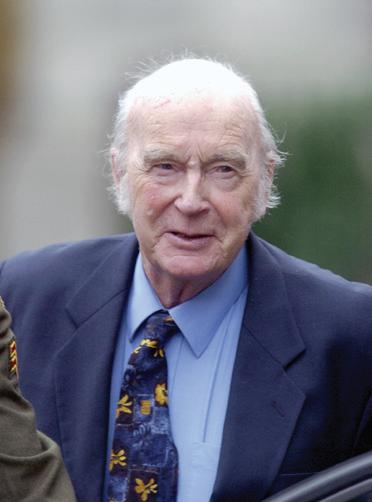

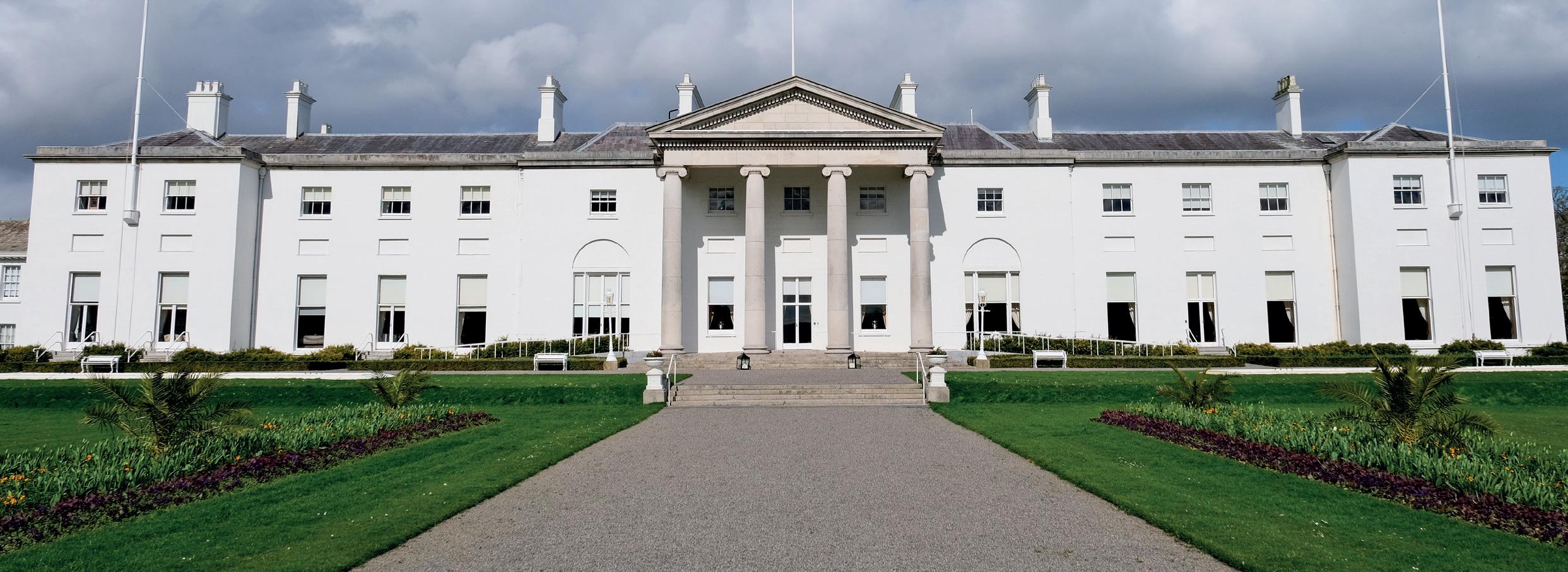
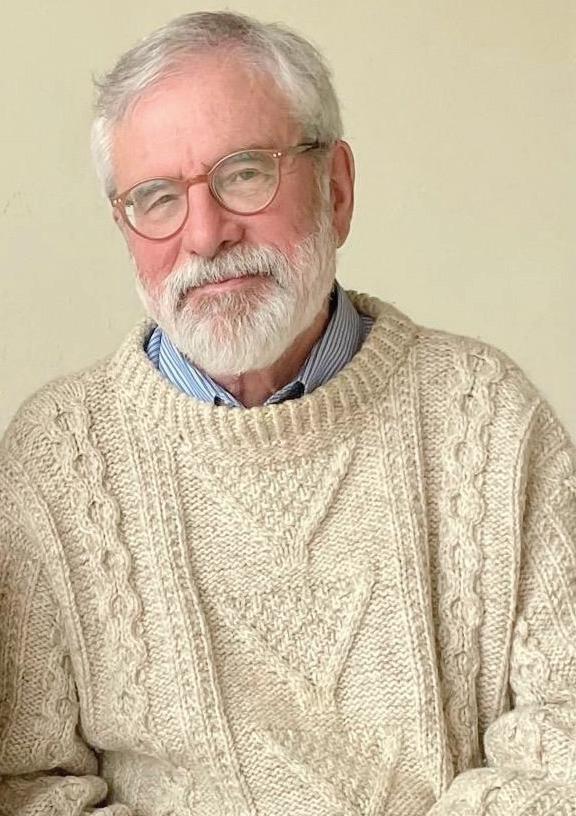
The inaugural issue of a new magazine, An Clogán, was launched at Féile an Phobail in August. An Clogán is a new socialist republican print and online magazine of politics and culture, focused on Ireland but with an international perspective.
The aim of the magazine is to facilitate debate and discussion and to foster this dialogue through its website, through public forums, and in an annual themed magazine. For their first issue the Editorial group “devoted to the theme to “The Republic”, a topic of central importance to the Irish left, but rarely addressed directly. Fintan Lalor once wrote: ‘Without agreement as to our objects, we cannot agree on the course we should follow.’ “ The magazine includes “contributions from leading Irish and international voices alongside emerging writers and political thinkers, including Gerry Adams, Clare Daly, Vincent Bevins, Claire Mitchell, Phillip Pettit, Margaret Ward, Kieran Allen, Ursula Ní Shionnain, and Cian O’Callaghan. We hope An Clogán can play a small role in clarifying our shared objects and helping chart a course toward the socialist republic.”
In this edition of Éire Nua we are carrying the first part of Gerry Adams interview with An Clogán. The interview addresses a number of issues including the right of self-determination; socialism; a socialist republic; the rights of citizens; empowerment and activism; changing passive support into activism; and more.
An Clogán is available at: www.connollybooks.org/product/anclogán-vol-1 www.facebook.com/people/AnClog%C3%A1n/61578000261605/
An Clogán: In a number of pieces, you have written you emphasise the importance of clarity regarding political objectives. In light of this I want to ask you a few questions about the long-stated end objective of the republican movement: a 32-county democratic socialist republic. But first, could you comment on this question of having clarity about political objectives?
Gerry Adams: I believe it’s essential to have a clear focus on your primary objective, especially if you adhere to the republican goal of a democratic socialist republic. That doesn’t mean those with different positions can’t be part of the effort for change.
But for those of us who believe in the vision outlined in the Proclamation, it’s crucial to be actively involved in leading or influencing the overall struggle. But there is also space for others who may not share our exact vision.
The big objective at this time is securing the right to self-determination, as outlined in the Good Friday Agreement. I believe there is majority support for this, and everything else depends on it.
We can’t wait for a 32-county socialist republic, or for partition to end, before addressing the homelessness crisis or the failings in our healthcare system. These issues must be worked on every single day.
If we compare where we are now to 50 years ago – or where we hope to be in 20 years – it’s clear that achieving a united Ireland and ending the connection with London would be a significant step. However, that alone wouldn’t necessarily fulfil our broader republican objectives. We must avoid the trap of thinking we can’t make huge headway on social issues in the present. We can’t wait for a 32-county socialist republic, or for partition to end, before addressing the homelessness crisis or the failings in our healthcare system. These issues must be worked on every single day.
For those of us who want not just a united Ireland, but a united Ireland with a real republic; and not just a real republic, but a republic which is socialist: achieving that requires electing a government with the right philosophy, policy, and strategy to make it happen.
An Clogán: Republicanism and “The Republic” have been used as a political identifier for a wide range of movements, and this curious fact is explored elsewhere in this issue of An Clogán. But could you explain, what does republicanism mean to you?
Gerry Adams: Republicanism, in a way, is what republicanism does. Oliver Cromwell was a republican. Fidel Castro was a republican. Donald Trump – God bless the mark – is a republican. There are many different kinds of republics and many different kinds of republicans.
For me,
a
republic means that the people are sovereign. You are not just a person; you are a citizen with rights, and those rights should be your birthright.
In many parts of the world, people lack even the most basic necessities – clean water, food, basic public services. But in a modern society like Ireland, what do rights truly mean? They mean that every person must be treated as an equal, regardless of gender, background, or
circumstances. Whether you are from the Traveller community, have a disability, or live in a rural area, your rights should be guaranteed by the republic simply because you were born in Ireland.
That includes the right to be free from hunger, the right to a home, the right to education, healthcare, and a clean environment – basic conditions any modern society should provide.
For me, a republic means that the people are sovereign. You are not just a person; you are a citizen with rights, and those rights should be your birthright.
A republic is ultimately just a particular form through which society is shaped or governed. But because it must be rights-based, it must also ensure these fundamental entitlements. And the reason the status quo refuses to enshrine these rights and entitlements in law is that doing so would limit the discretion of those in power. If people had a guaranteed right to public healthcare, for example, then privatisation would no longer be an option. That doesn’t mean private medicine couldn’t exist, but it does mean the state would be obligated to provide healthcare free at the point of delivery.
A meaningful republic must be one that acknowledges and upholds the rights of its citizens – not just in theory, but in practice.
An Clogán: Another aspect of the goal of a 32-county democratic socialist republic is socialism. Sometimes people use the word socialism to mean something like a Nordic style welfare state. But previously you have given a much more precise definition. In “Free Ireland: Towards a Lasting Peace” (1995) you say that socialism “is a definite form of society in which the main means of production, distribution and exchange are socially owned and controlled and in which production is based on human need rather than private profit. Socialism is based on the most thorough-going democratisation of the economic system, side by side with the most thorough-going democracy in politics and public affairs. Socialism includes and is a stage in advance of republicanism.”
Could you explain what you understand socialism to mean and how is it related to republican politics?
Gerry Adams: I stand by what I said in 1995. I’m with James Connolly on this – he spoke about the re-conquest of Ireland by the Irish people, including economic re-conquest. In its broadest sense, this means undoing the historical conquest by England – ending partition if that is the will of the people. Socialism is, in many ways, a more advanced way of organising society than republicanism. Republicanism emerged in opposition to monarchies and the idea of divine rights. It asserted that people were citizens, not subjects, and deserved to be treated equally.
In today’s world, this means ensuring that the economy serves the people, not the other way around. It means democratic control of production, distribution, and exchange and ensuring that that’s all socially owned. Even if we don’t achieve our ultimate goal – and I
believe we should strive, advocate, agitate, educate, and work toward it – there is still immense value in ending the union, empowering people to exercise their right to self-determination, and building a true republic. From there, we can push further, advancing toward a system where economic rights are firmly secured through the organisation of the economy itself. Of course, we have to work within the realities of our time. Will there still be space for private enterprise and other forms of ownership? Yes. Some people have particular talents, ambition, or drive, and that should be encouraged. But the fundamental measure of our economy shouldn’t be how many millionaires we have – it should be how well we take care of those in the most vulnerable positions.
At its core, this is about the pursuit of human happiness – about ensuring that no one is burdened beyond what they can bear. People should not have to live under the constant stress of economic hardship.
The 26 counties is one of the wealthiest countries in the world, yet we still see widespread suffering – families struggling to take care of a child with disabilities, people unable to afford basic necessities, communities where opportunities are limited by postcode. Many people, especially women, feel the immense stress of struggling to provide for their family, unsure how they’ll manage to put dinner on the table tomorrow, find clothes for their child to attend school, or even secure access to a school at all. This is preventing our society from nurturing every child’s full potential. True equality must be social and political, but it must be economic as well. Society must be structured to reflect and uphold that principle. There’s no reason for us to wait for systemic change to start making progress. We can start building workers’ cooperatives and community cooperatives. People coming together shaping their own communities, their own housing estates, their own villages, our own educational process, open to all and including Irish language education. Building a place where everyone knows and supports each other, where kindness, tolerance, and welcome are foundational. But beyond that, a place where people can truly be happy. At its core, this is about the pursuit of human happiness –about ensuring that no one is burdened beyond what they can bear. People should not have to live under the constant stress of economic hardship. In my time in elected office, what struck me most was how many people are crushed by economic and social inequality. Society simply moved on, leaving them behind.
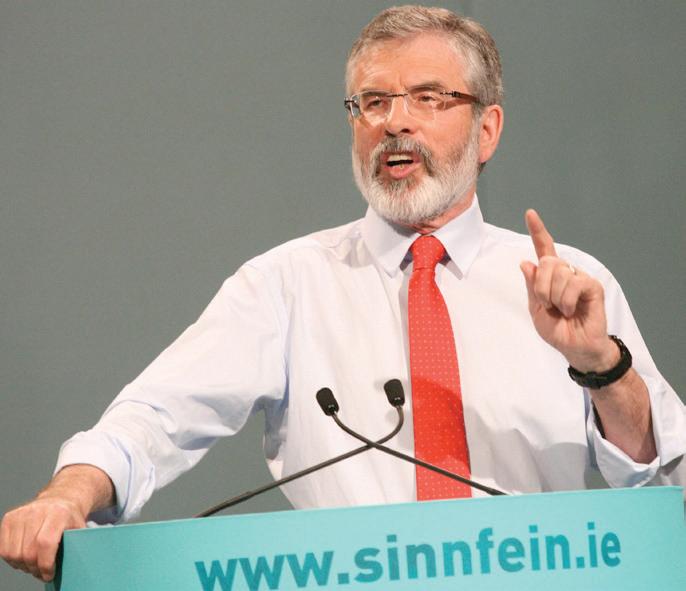
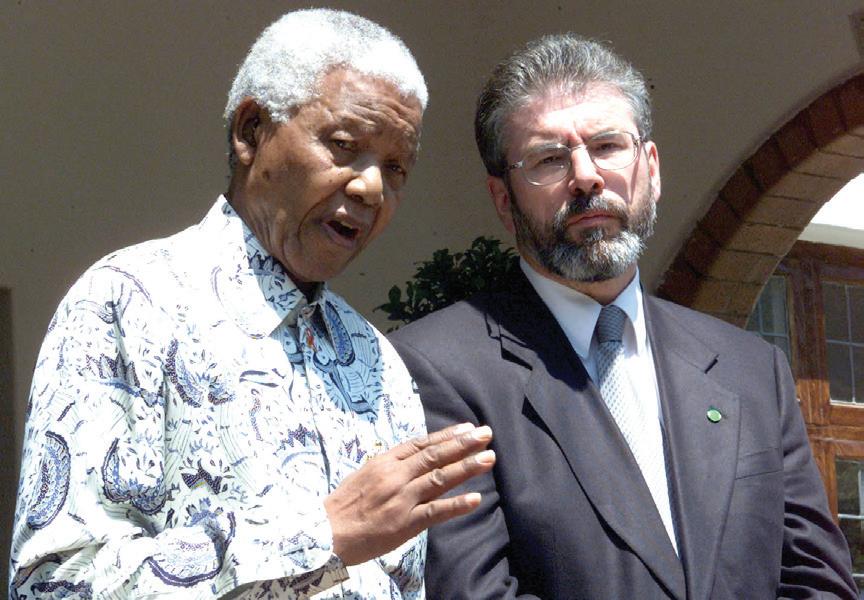
An Clogán: You’ve highlighted the connection between a socialist, needs-based economy – one focused on meeting people’s needs – and the republican ideal of a republic of equal citizens. Despite our society’s vast productive capacity and wealth, many people still struggle to have their basic needs met. That contradiction is clear.
You also touched on a key point: to build an economy based on meeting people’s needs, we need the political tools to do so. That means ensuring that sovereignty truly rests with the people. This, in turn, connects to the broader republican goal of ending partition. Could you speak about the importance of ending partition in achieving this objective and advancing this political vision?
Gerry Adams: A key word in all of this is empowerment.
I’m speaking to you in West Belfast. This area, especially the lower part, used to be a massive slum – similar to parts of inner-city Dublin in the late 1960s. But over decades, through people taking action and empowering themselves, conditions have improved. The more people feel empowered, the more their expectations and potential grow. But when people feel trapped – when they see no way out of hardship – it breeds alcoholism, domestic abuse, apathy, depression, dependence on prescription drugs. Empowerment isn’t just about marching with clenched fists under a red flag. It’s about people realising their own worth and taking an active role in shaping
their communities. It’s about working together to improve life, especially for those who cannot improve it for themselves. There can be no progress without struggle and no effective struggle without a movement or movements of citizen activists.
Most of us – at least the people I work with – will do okay. But many people won’t, unless they receive real, structured support. And I don’t mean charity, though charity has its place. I mean support as an entitlement – as a birthright of citizenship.
There can be no progress without struggle and no effective struggle without a movement or movements of citizen activists.
But, returning to the issue of partition and self-determination – right now, we can’t determine our own future. Theoretically, you could have a socialist republic declared in the 26 counties. It’s also theoretically possible, if you stretch your imagination, to declare a republic in the six counties. But the reality is that the purse strings, control and sovereignty remain vested in a parliament in London, not here. And, a London Parliament will of course take decisions on its own interest, not in the interest of anyone in Ireland. No matter what steps we take to improve our society, we will always hit the barrier of a London
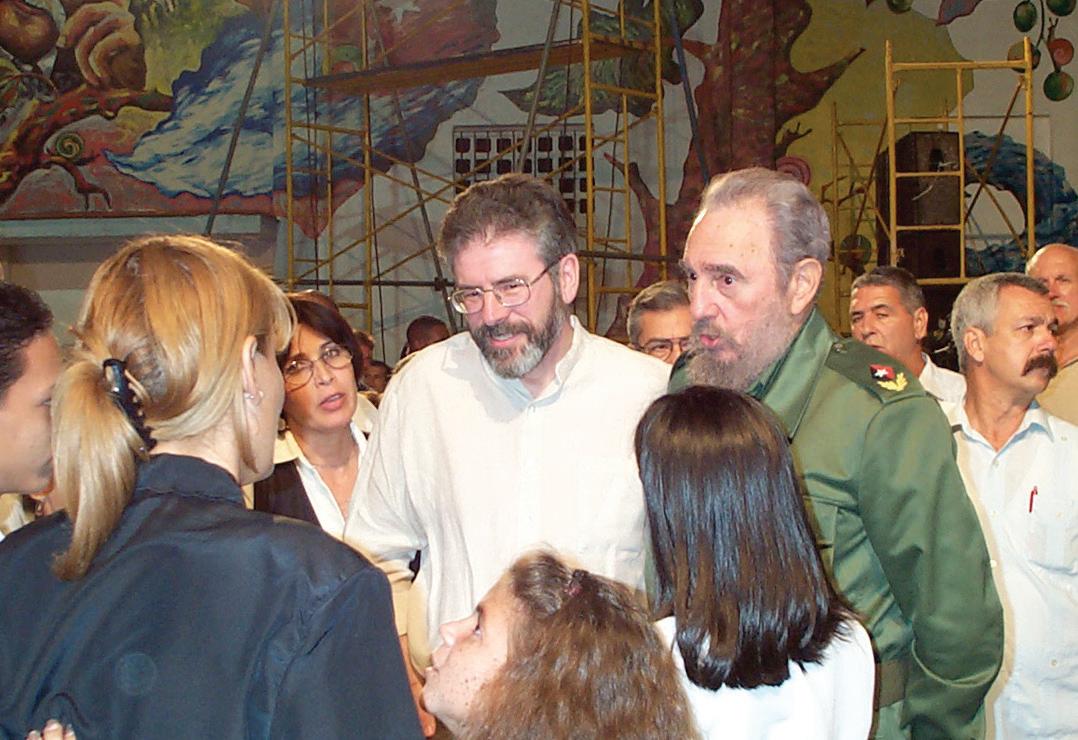
parliament that prioritises its own interests over those of Ireland. Since the earliest days of republicanism, over 200 years ago, the connection with England has been identified as the root cause of disharmony and difficulty on this island.
While we are not facing the extreme conditions of the past –Cromwell is not here, nor is the Great Hunger – we still lack the ability to fully control our own affairs. You can introduce egalitarian measures and work to improve the conditions of working people, but you will always be limited. As James Connolly said, “The cause of labour is the cause of Ireland, the cause of Ireland is the cause of labour.”
He debated this point with William Walker. Connolly described Walker’s ideas as “Gas and Water Works socialism” – useful in their own way but not enough. If we want to build a real republic today and create the kind of society we are discussing, we must end the connection with Britain.
In my opinion, that connection will end. We have approached this thoughtfully, with clear steps for how it can be accomplished. The Good Friday Agreement, despite its imperfections, provides a roadmap for this. It lays out a democratic process for ending the connection with England – if that is what people want.
Even though the Irish and British governments may not want to pursue this path, the option remains. That should be our main focus: the full implementation of the Good Friday Agreement. Regardless of personal views on socialism or republicanism, anyone who considers themselves progressive
should support this. It is simply common sense for the Irish government to plan for the future. We planned this interview – without planning, it wouldn’t have happened. For a government to refuse to plan for the future is utterly reprehensible. It goes against their own party objectives, their constitutional obligations, and the Good Friday Agreement. What should unite all political perspectives is the principle that people have the right to decide their own future. That’s enshrined in the Good Friday Agreement. We need to start planning for that future now. Achieving this would be a major step, but real progress will only come through an empowered political movement. There is no room for spectators. We all have a role and a strong, cohesive, and ideologically grounded movement of Irish republicans is needed to drive this forward.
If we want to build a real republic today and create the kind of society we are discussing, we must end the connection with Britain.
Given my understanding of Irish republicanism, that is what must drive us through these various – though I hesitate to use the word – stages, or rather, phases. First, the phase of self-determination: moving from partition into a new national democracy. The question then becomes; how do we transition from a post-union Ireland to a real republic? Could an empowered political movement, having brought us to that point alongside others, then go on to form a government and democratically implement the socialist measures necessary to serve the Irish people?
Beyond that, there is also an international dimension to consider. Ireland, small as it is, has a role to play in setting an example – not just in struggle, but in supporting others around the world who are fighting for justice.
Part 2 of this interview will be included in the next edition of Éire Nua
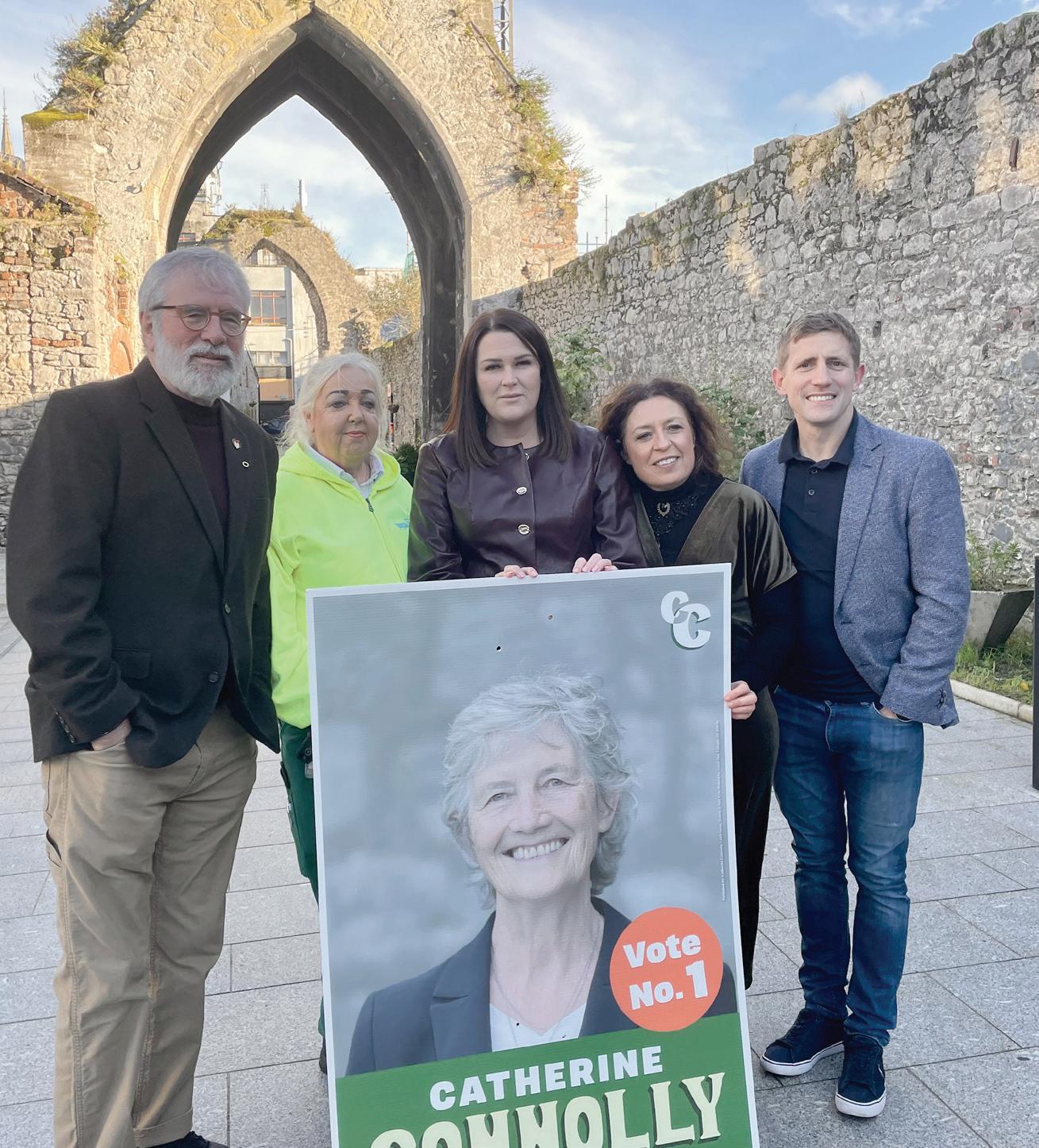

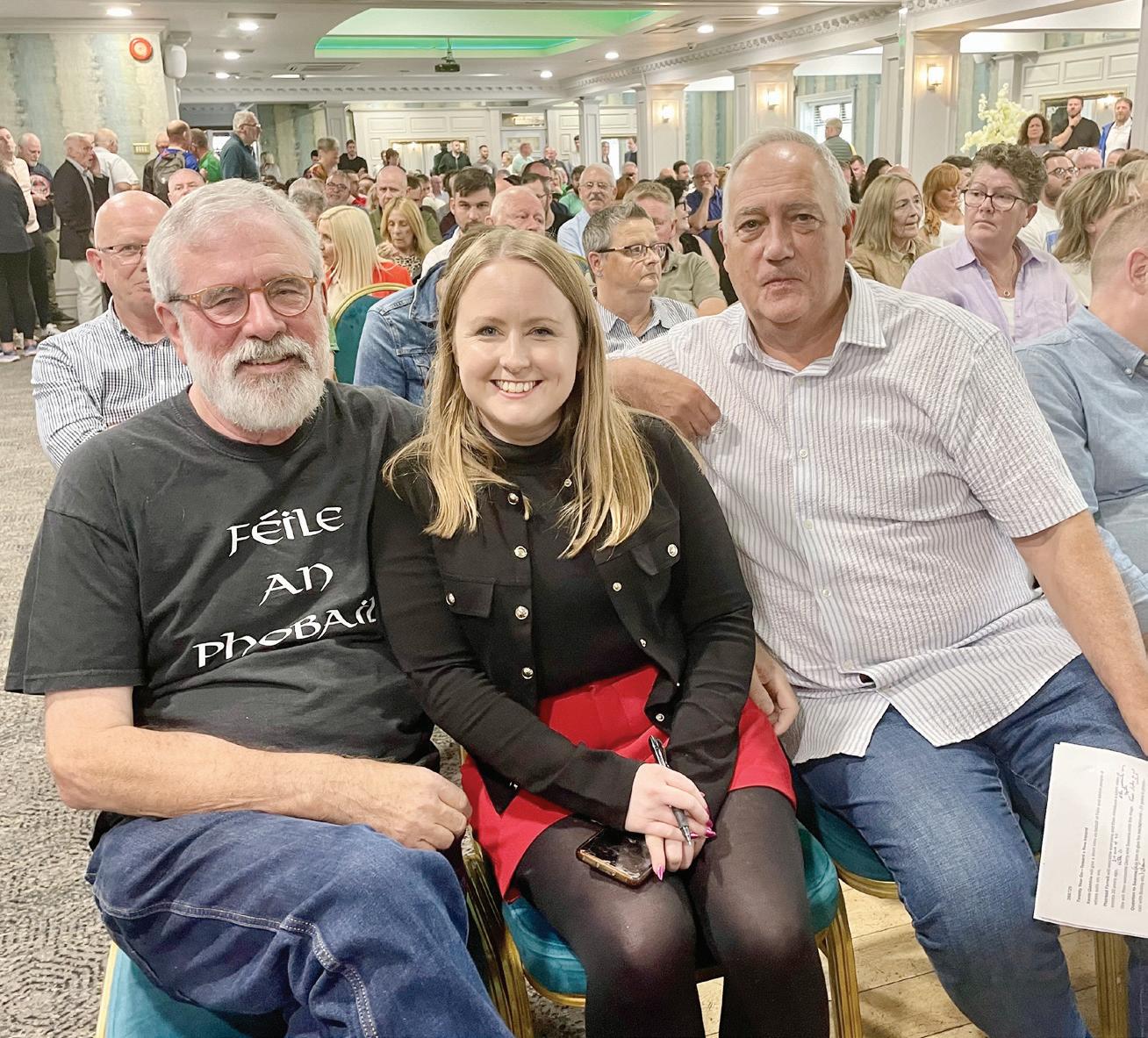

ByDeclan KearneyMLA
On Saturday 1st November Sinn Féin National Chairperson, Declan Kearney MLA travelled to Vienna, Austria to attend and address the European Forum. This is an annual conference that brings together left-wing, green and progressive political and social movements from across Europe to deliberate and discuss pertinent issues.
Declan Kearney addressed two panel discussion events that separately focussed on the role of national liberation politics and defending Irish neutrality. The forum also featured panel events that discussed the limitations of democracy in Europe, solutions to the housing crisis, militarism, popularism, neo-liberalism, climate change and global peace.
The attendance by Sinn Féin representatives at such conferences underlines the imperative of utilising every forum and all progressive forces domestically, and internationally to advance the cause of Ireland and achieve social, economic and cultural liberty.
Addressing the European Forum panel discussion ‘Another World is Possible: The Role of National Liberation Politics’ – alongside Vera Polycarpou (AKEL), Adrià Guevara (ERC) and Walter Baier (Party of the European Left), the Sinn Féin leader said:
A palpable uncertainty and
instability have engulfed global affairs. The words and actions of the US President Donald Trump signal the onset of a new, dangerous world order which is hostile to diplomacy and multilateralism. The present-day imperialist and colonial priorities and alliances of the big western powers and global oligarchs are in the ascendancy.
Nowhere is this more clearly in evidence than in Palestine. The complexion of the modern world has been determined by the role of imperialism and colonialism. A cartel of western powers dominates geo-political relations through the G7 and NATO, and with the use of vetoes within the United Nations Security Council.
The imposition of the G7’s geopolitical interests have now institutionalised the gap between the global north and south. An international division of humanity exists which has ossified a neocolonial framework which underpins global relations. The fact is that the ideology of the
big powers in the global north is premised upon a built-in psychology of racial superiority: Inferiority is still defined by skin colour, culture and language.
That is why the expanding BRICS partnership of 11 countries, the existence of the Community of Latin American and Caribbean States (CELAC), South Africa’s courageous legal action under the Genocide Convention, and the formation of The Hague Group, are all so important.
The pursuit of self-determination and national democracy is the essential international struggle of our time: The right of nations to make their own laws, decide their relations with other nations, and to determine their own destinies, as expressly provided in the UN Charter. This is what sits at the root of the wars in Ukraine and Palestine.
Respect for self-determination is the key to establishing and maintaining
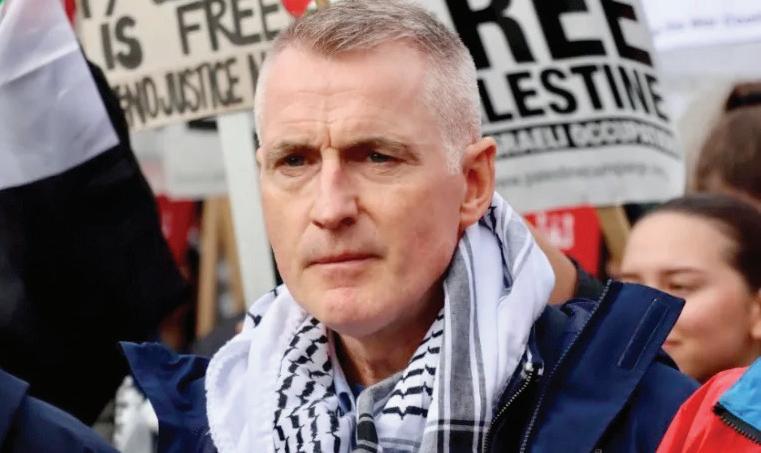
a multi-polar world based upon equality, diplomacy and peaceful co-existence.
In Ireland, constitutional change is finally on the political horizon. Partition is now conditional, because the mechanism for national self-determination has been secured within the Good Friday Agreement.
Of course, Irish unity is not inevitable, but a unity referendum is, and Sinn Féin has made that an objective to be scheduled by 2030.
Ireland’s political landscape has been irreversibly changed by the peace process, Brexit, demographic changes, political realignments, and the influence of Republican political strategy. A new era of democratic politics now centres upon the role of persuasion, negotiation, creating progressive alliances, and building popular support for change.
Within this context, the landslide victory of Catherine Connolly to be elected President of Ireland is of major significance. Her values and ambition became a lightning rod which forged a remarkable coalition among parties of the political left and others. The transformation of
Irish society, an end to partition, and the creation of a new national republic will depend upon building durable alliances.
It is still too early to say if this Presidential campaign heralds a new political realignment in Ireland. However, it does show the potential exists to do so, and to build a path to the election of a left republican government in the southern state.
Progressive internationalism is also an expression of our Irish Republicanism. So, while we seek international allies for the cause of Irish reunification, Sinn Féin embraces our working in solidarity with those oppressed by colonialism, occupation and apartheid. As internationalists, we have a responsibility to give hope and deliver positive change in the world.
Palestine is the most totemic national democratic struggle of our generation. It is a microcosm of the contradiction between colonialism and the forces committed to national democracy. The occupation of Palestine and reactionary nature of this emerging world order
now demand that a fundamental, strategic discussion commences among political parties, movements and governments from within the national liberation tradition.
There is an urgent need for a coalescence around a new global vision based upon multipolarity and multilateralism, and for alliances to create a counterweight against the surge of neo-colonialism.
That is, a new internationalist political agenda with national democracy and self-determination at its core. One which draws on the revolutionary experience of the global south and north. And also advances a realistic and pragmatic alternative to guarantee the national and social rights of working peoples.
The politics of national liberation have never been more relevant than in the current global context, and how another world can be made possible.
Declan Kearney MLA, Sinn Féin National Chairperson
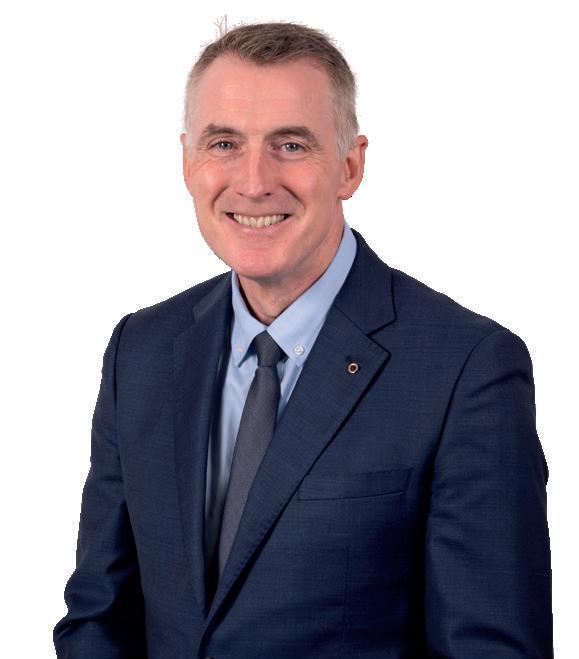
ByJimGibney

St Mary’s University College on Belfast’s Falls Road celebrated its 125th anniversary on October 16th, 2025. In a video to mark this special and remarkable anniversary the principal, Peter Finn reminded us all that when the College opened in 1900 all of the 100 students were women. He said: “the women came from all over Ireland. They were trained to be teachers in primary schools. That cohort of teachers and all those who followed made an enormous impact on Ireland, North and South.”
St Mary’s special occasion coincided with Feile an Phobal’s biggest and best Féile in its 37-year history – a success that St Mary’s has played a huge part in. During the 14 days of Féile St. Mary’s is the main venue for Féile’s debates, discussions and visual arts and exhibitions. It morphs into a roof covered amphitheatre. It provides a generous spectrum of hospitality for all those attending Féile, participants or spectators, which makes their overall experience a positive and memorable one.

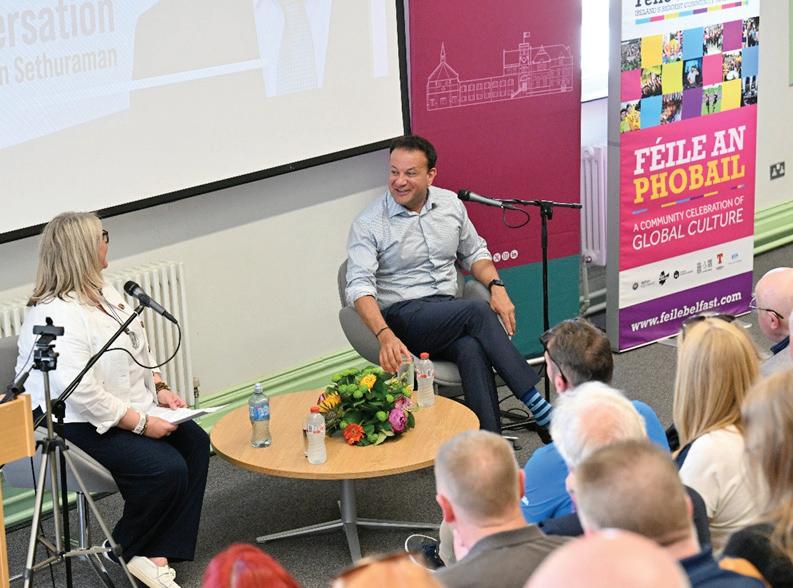

This year Féile held over 80 debates and discussions many of them reflecting the increasing interest in Irish Unity. Commenting on this Bill Rolston, Chairperson of Féile’s Debates and Discussion group said: “This year’s programme was a mix of information and education as well as debate and camaraderie. Topics ranged from Irish Unity and history to international affairs and from personal memoir to constitutional matters.”
Former SDLP leader Colm Eastwood’s New Ireland event was one of many dealing with the issue of the future prospects for a united Ireland. He repeated his call for all nationalist parties to cooperate and present the case for a new Ireland while retaining their distinctive differences on many other issues.
A founding member of the Democratic Unionist Party, Wallace Thompson, was a panellist at West Belfast Talks Back. An evangelical believer he urged unionist and Protestants to engage in the debate about Ireland’s future.
The Reverend David Moore, Presbyterian minister for West Belfast, now a regular event organiser at Féile, presented William Mc Mullen’s life through the historian Dr Christopher Loughlin as a radical Presbyterian, a close associate of James Connolly and involved in Irish and British labour history. Reverend Moore said, “This story disrupts stereotypes, opens minds and aims to foster greater community understanding.”
One of Féile’s women-themed events – ‘A Shared Feminist Future for Ireland’ brought the Belfast Women’s Assembly and the National Women’s Council of Ireland together to discuss what a shared feminist future would look like. Chaired by Sinn Féin TD Rose Conway Walsh the panel included Jennifer Okeke, Orla O’Connor, Eileen Weir and Sophie Nelson.
Uachtarán Shinn Féin Mary Lou McDonald TD was interviewed by the redoubtable Andreé Murphy, who,
with her relaxed and incisive interviewing style, brings out the best in the person she is interviewing. They spoke about the enormous opportunities that unity can bring and Mary Lou called for the preparations for positive constitutional change to start now. “I believe we will see referendums on Irish Unity by the end of this decade. It’s the job of those of us who believe in a United Ireland to drive the conversation, to persuade more and more people, to keep building the incredible momentum to achieve unity in our time.”
A personal republican eye on the struggle for a united Ireland was provided through two books launched at Féile – ‘Our Martin’, about Martin McGuinness by Jim McVeigh and ‘Siobhan O’Hanlon – A Sound Woman’ by Gerry Adams and Richard McAuley. Both stories bring out the ordinary, human lives of Martin and Siobhan and how they shaped the struggle, and the struggle shaped them and in Siobhan’s case the role of women.
A joint collaboration between Dublin City University and Ulster University authored by the economist Professor John Doyle produced an economic report assessing the cost of a united Ireland over its first ten years. John Doyle gave an insightful view of how the economy of the island of Ireland is more than capable of building a prosperous future.
Finally, the plight of the Palestinian people was never far from Féile with Palestinian Day attracting big crowds and Avi Shlaim, an Israeli historian here talking to a packed hall in St. Mary’s about the genocide in Gaza.
Well done to all of those who planned, organised, participated in, or generally contributed to a hugely successful Féile an Phobail.
Jim Gibney is a long standing Republican activist, former political prisoner and columnist

ByShónaghNíRaghallaighTD
I mí Meán Fómhair, bhí de phribhléid agam páirt a ghlacadh i Loingeas Domhanda Sumud (Global Sumud Flotilla) sa Túinéis, cruinniú cumhachtach de ghníomhaithe ó gach cearn den domhan, aontaithe ina streachailt ar son an cheartais. Mar Theachta Dála de chuid Shinn Féin, mar chainteoir Gaeilge agus mar phoblachtánach tiomanta, d’amharc mé air seo ní hamháin mar ghníomh dlúthpháirtíochta le muintir na Palaistíne, ach mar chuid de ghluaiseacht dhomhanda níos leithne ag saothrú ar son na saoirse agus cearta féinchinntiúcháin, gluaiseacht atá nasctha go dlúth leis an gcúis phoblachtánach in Éirinn. Thóg an loingeas meascán iontach daoine, ó mháithreacha, go hiriseoirí, dochtúirí agus gníomhaithe le chéile. Gnáthdhaoine ag tabhairt faoin obair ar chóir a bheith idir lámha ag rialtais an domhain. Ba ón Domhan Theas formhór na rannpháirtithe lenar bhuail mé, rud a léirigh nádúr domhanda na streachailte seo. Bhuail mé le daoine ó gach cearn den domhan, gach duine díobh tiomanta don sprioc chéanna: deireadh a chur leis an an smacht coilíneach agus tacú le ceart mhuintir na Palsitíne maireachtáil le saoirse agus le dínit. Ar dtús, cuireadh moill ar na báid ó Barcelona de dheasca drochaimsire. Ar an drochuair, cuireadh breis dúshláin thromchúiseacha orainn freisin - dhá ionsaí dróin agus moilleanna a mhair breis is coicís sa chalafort sa Túinéis. I mo chás féin agus i gcás go leor eile, bhí orm filleadh abhaile sula bhféadfadh an loingeas leanúint ar aghaidh go Gaza.
In ainneoin na ndúshlán sin, d’fhan spiorad loingis slán agus láidir.

Nuair a sheol na báid i dtreo Gaza, cuireadh fáiltiú foréigneach roimh na gníomhaithe. Fuadaíodh iad ag stát Iosrael in uiscí idirnáisiúnta, gabhadh iad, agus coimeádadh go mídhleathach iad. Ní dhearna sé sin ach tuilleadh béime a leagan ar an ngá práinneach atá le dlúthpháirtíocht idirnáisiúnta agus le brú leanúnach a chur ar rialtais chun cearta daonna a chosaint. Domsa, bhí an taithí seo thar a bheith mothúchánach agus dhearbhaigh sí tábhacht an naisc idir ár streachailt ar son aontacht na hÉireann agus na streachailtí frithchoilíneacha eile ar fud an domhain ar son an cheartais. Amhail is atá muintir na Palaistíne ag iarraidh saoirse agus cearta féinchinntiúcháin, táimidne in Éirinn fós ag saothrú i dtreo Éire aontaithe atá bunaithe ar chomhionannas agus
ar mheas.
Cé go mbaineann ár dtroid sa bhaile, is cuid í de scéal idirnáisiúnta i bhfad níos leithne, scéal a éilíonn orainn seasamh go daingean le daoine atá ag troid i gcoinne an éagóra cibé áit ina bhfuil siad. Mar chainteoir Gaeilge agus múinteoir bunscoile, creidim freisin go bhfuil sé ríthábhachtach ár gcultúr agus ár bhféiniúlacht a chaomhnú mar bhunchlocha d’Éire shaor agus aontaithe.
Léirigh an Global Sumud Flotilla dom go maireann dóchas agus buanseasmhacht fiú amháin i ndorchadas na gcruatan. Meabhraigh an taithí seo mo thiomantas oibriú ar son aontacht na hÉireann- ní mar sprioc pholaitiúil amháin, ach mar chuid de ghluaiseacht dhomhanda ar son ceartais, díníte agus síochána.
People’s Assembly
Dear Mr Smith,
CATCHUPONEVENTSTHATHAVE TAKENPLACESINCETHELASTEDITION OFÉIRENUAWASPUBLISHED.
This text is only intended to show that the recommended font for letters is Arial 10.5pt. You can choose your preferred line spacing. This text is only intended to show that the recommended font for letters is Arial 10.5pt. You can choose your preferred line spacing.This text is only intended to show that the recommended font for letters is Arial 10.5pt. You can choose your preferred line spacing.This text is only intended to show that the recommended font for letters is Arial 10.5pt. You can choose your preferred line spacing.This text is only intended to show that the recommended font for letters is Arial 10.5pt. You can choose your preferred line spacing.
In July 2022, Sinn Féin established the Commission on the Future of Ireland to undertake a broad and deep consultation with people all across the island and beyond on our shared future. Chaired by Declan Kearney MLA, with Lynn Boylan MEP as vice chair, the Commission has hosted discussions on our future, across Ireland and internationally.
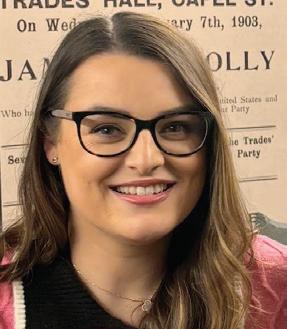
Dear Mr Smith,
Coimisiún Shinn Féin ar Thodhchaí na hÉireann. Scrúdaigh sé go sonrach ról na nGaelgóirí i dtreo aontú na hÉireann.
This text is only intended to show that the recommended font for letters is Arial 10.5pt. You can choose your preferred line spacing. This text is only intended to show that the recommended font for letters is Arial 10.5pt. You can choose your preferred line spacing.This text is only intended to show that the recommended font for letters is Arial 10.5pt. You can choose your preferred line spacing.This text is only intended to show that the recommended font for letters is Arial 10.5pt. You can choose your preferred line spacing.This text is only intended to show that the recommended font for letters is Arial 10.5pt. You can choose your preferred line spacing. This text is only intended to show that the recommended font for letters is Arial 10.5pt. You can choose your preferred line spacing. This text is only intended to show that the recommended font for letters is Arial 10.5pt. You can choose your preferred line spacing.This text is only intended to show that the recommended font for letters is Arial 10.5pt. You can choose your preferred line spacing.This text is only intended to show that the recommended font for letters is Arial 10.5pt. You can choose your preferred line spacing.This text is only intended to show that the recommended font for letters is Arial 10.5pt. You can choose your preferred line spacing.
Yours Sincerely,
Name Surname Title or Position
This discussion took place in the Gasyard Centre, Derry on Thursday 7th of August. The discussion was chaired by Pat Cullen MP. The panel included Ciara Ferguson MLA who explained that part of our collective task is to encourage, inform and further the conversation on the kind of New Ireland we want to see: and a fairer and more equitable Ireland in which all can enjoy a better quality of life and can have access to a health service that meets the needs of a changing society.
There was a lot of audience engagement from lobby groups, health workers, health organisations and others. Copies of Sinn Féin’s new discussion document on ‘An all Ireland National Health Service’ were also distributed. You can access the document here: Sinn Féin Policy Documents - Sinn Féin BELFAST YOUTH ASSEMBLY
The Belfast Youth Assembly was hosted in conjunction with Forthspring Intercommunity Group. The assembly was made up of young people from different walks of life. One thing that was clear from the activities and discussion was that they all wanted a better future. Even with the different backgrounds in the room, there was common ground between the young people on issues such as healthcare, education, social media, tackling poverty etc. The young people had more in common than what divided them.
Each person in the room was encouraged to not be afraid of sharing their hopes, dreams and concerns. They knew the journey ahead would not be without its challenges, but by working together and engaging with each other they were confident that they could play their part in shaping a new Ireland. The report of the event can be accessed here: www.sinnfein.ie/futureofireland
OIREACHTAS NA SAMHNA
‘Ról Na nGael i dTógáil Éire Nua’ took place at this years Oireachtas na Samhna in Belfast on Friday 31st October.
Ceann de na himeachtaí ag Oireachtas na Samhna eagraíodh é ag
Cuir Tomás Ó Néill fáilte roimh an tionál ar son Shinn Fein mBeal Feirste. D’oscail Aisling Reilly MLA, duine den ghlúin úr seo sa chathair, an imeacht agus labhair sí ar na deiseanna romhainn fríd Aontacht – “deis fháis, deis cheangail agus deis ar rathúlachta chomhchoitinn”.
Dúirt Aisling gur mór an seans go mbeadh ann don Reifreann le linn Uachtaránacht Catherine Connolly agus go bhfuil muidne, muintir na hÉireann i bhfad chun tosaigh ar an Rialtas. Lá i ndiaidh lae, tá níos mó daoine, eagraíochtaí agus grúpaí a rá go bhfuil dualgas ar an Rialtas i mBaile Átha Cliath tabhairt fán phleanáil agus ullmhúchán do reifreann agus d’athaontú na tíre.
Chuala muid arís go láidir ón phainéal, an Cathaoirleach Édel Ní Churraoin,agus Dr Niall Comer, Paula Melvin agus Ciarán Mac Giolla Bhéin, go bhfuil ról lárnach do na Gaeil in aon tír úr agus caithfear an Ghaeilge bheith mar chuid de sin.
Tháinig téama amháin go minic aníos ón phainéal is ón lucht feachána go raibh fís de dhíth; fís den sórt tíre a bheas againn agus is é an fhís seo a bhí is atá ar iarraidh ag Fianna Fáil is Fine Gael le breis is 100 bliain. An dearfacht a thug Catherine Connolly fríd a feachtais, is í sin an dearfacht chéanna atá á lorg ag an phobal agus rud nach bhfuil ag an Rialtas seo. Tá an comhrá beo linn faoi dheiseanna, fhéidearthachtaí agus bhuntáistí a thiocfas amach as Éirinn nua – luíonn sé ar an Rialtas tabhairt fán réamhobair anois!
This text is only intended to show that the your preferred line spacing. This text is only Arial 10.5pt. You can choose your preferred recommended font for letters is Arial 10.5pt. intended to show that the recommended line spacing.This text is only intended to show can choose your preferred line spacing. This text is only intended to show that the your preferred line spacing. This text is only Arial 10.5pt. You can choose your preferred recommended font for letters is Arial 10.5pt. intended to show that the recommended line spacing.This text is only intended to show can choose your preferred line spacing. This text is only intended to show that the your preferred line spacing. This text is only Arial 10.5pt. You can choose your preferred recommended font for letters is Arial 10.5pt. intended to show that the recommended line spacing.This text is only intended to show can choose your preferred line spacing.
Yours Sincerely,
Surname
Ach mar d’fhoghlaim muid fádó, is orainne atá sé leis an obair a dhéanamh agus sin an rud a dhéanfaidh muid beag beann ar aon Rialtas.
Footage of the event can be watched here: FRIENDS OF SINN FÉIN
Events are continuing to be hosted by Friends of Sinn Féin in America and Canada. Since the last edition of Éire Nua events have taken place in San Francisco, Vancouver, Hartford, Boston and Philadelphia. Guest speakers included John Finucane MP and Mairéad Farrell TD. These events have been an opportunity for the Irish abroad and others to discuss the opportunity to unite Ireland, the potential to define a new state, and to strategize on the way forward. At the meetings was a hope for the future and the recognition of the potential of Irish Unity. There was a recognition that an opportunity not realised is an opportunity squandered.
Sinn Féin’s Commission on the Future of Ireland will host a discussion on ‘Delivering Rural Health and Care in a New Ireland’ at 7pm on Wednesday 26th November in the Westville Hotel, Enniskillen.
You are invited to come along and join the discussion on a new Ireland, how it could be achieved and what it might look like in relation to our Health Service.
The conversation will be led by Pat Cullen MP and an independent panel which will be announced soon.
Uachtarán Shinn Féin Mary Lou McDonald will deliver the opening address. You can register to attend the event by clicking the link here: Delivering Rural Health & Care in a New Ireland Tickets, Wed, Nov 26, 2025 at 7:00 PM | Eventbrite COMMISSION ON THE FUTURE OF IRELAND ANNUAL REPORT
The annual report of the Commission on the Future of Ireland will launch its 2025 annual report in early December (date to be announced soon.)
The report will give an overview of all of the events that have taken place throughout 2025 and will give an insight into some of the work we intend to take forward in 2026.
Keep up to date with future events and read reports from the past events at www.sinnfein.ie/futureofireland and the Commission social media pages.
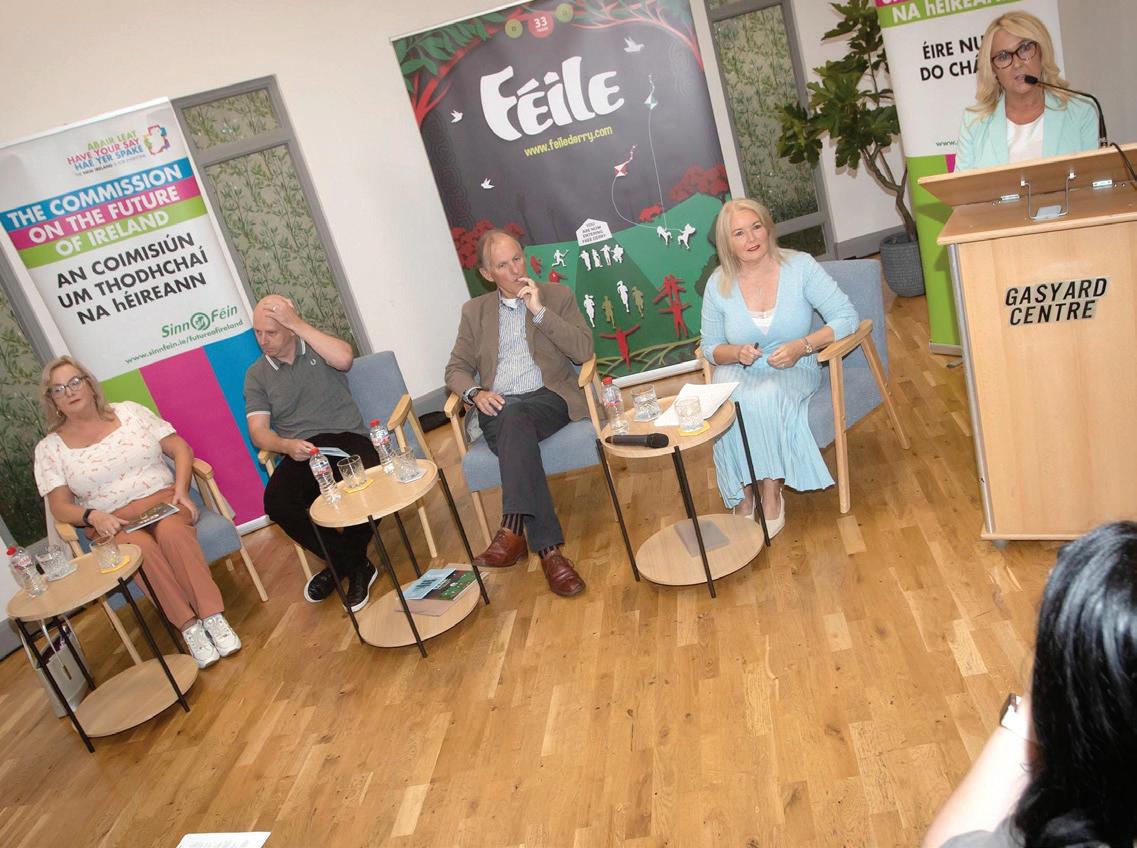
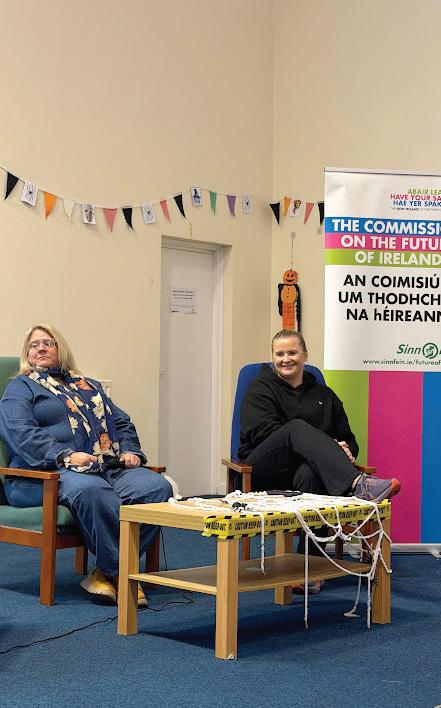
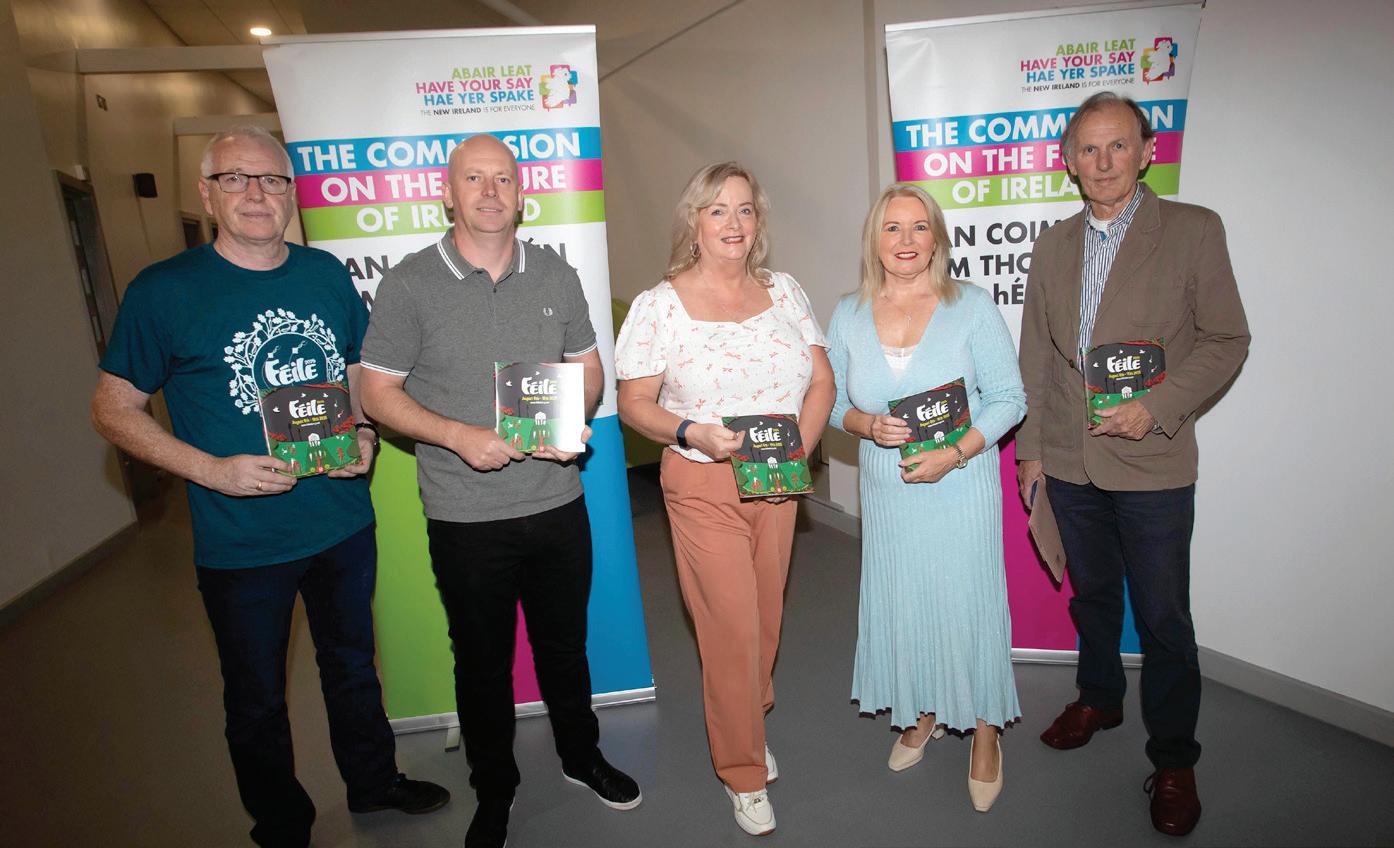
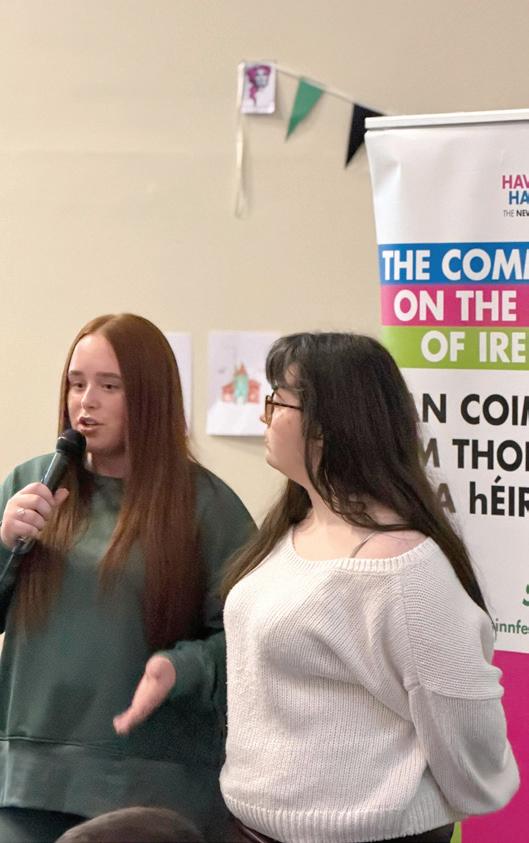
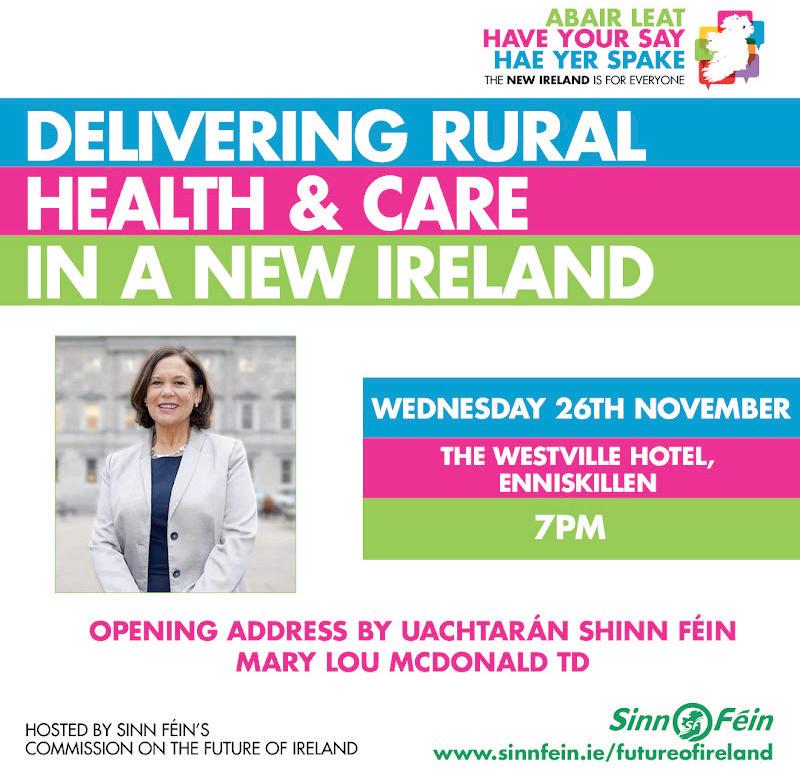
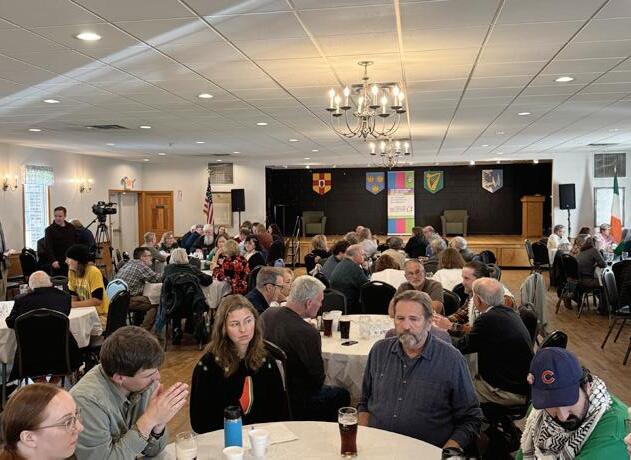

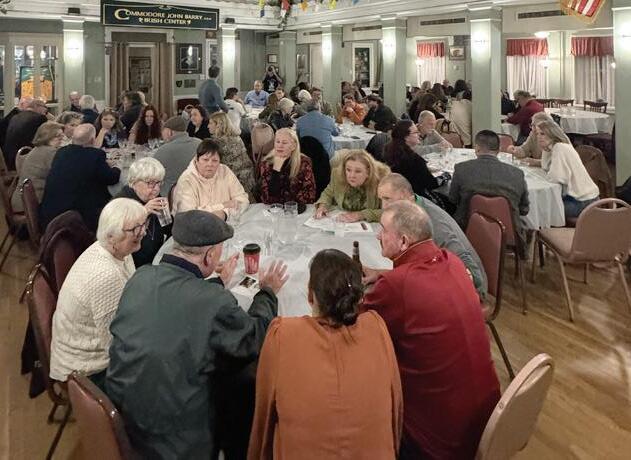

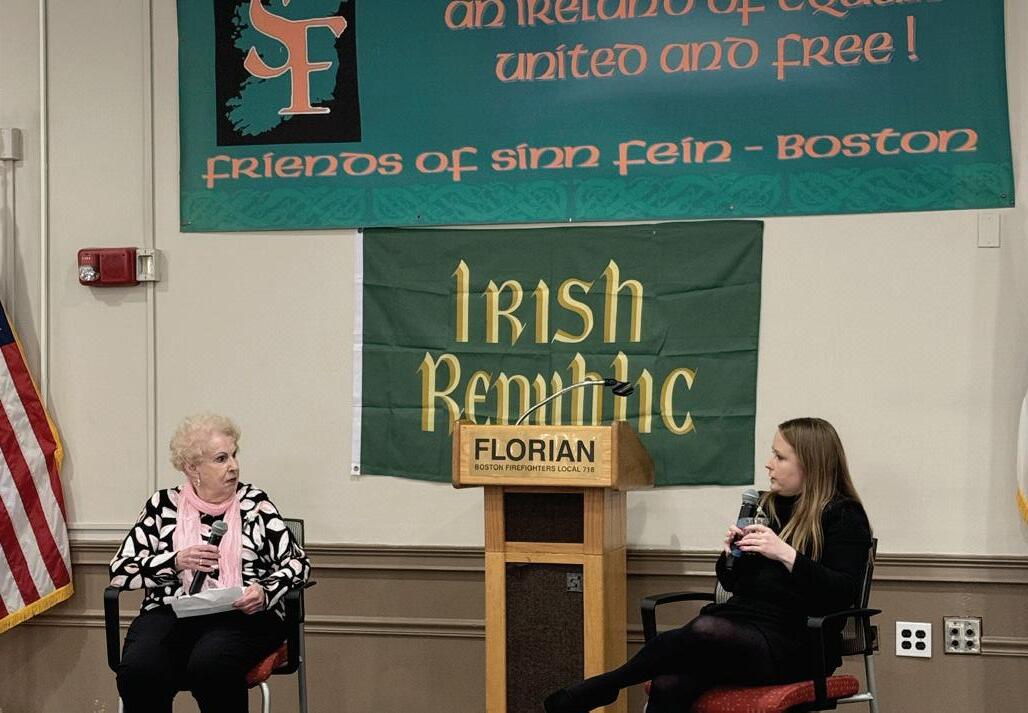
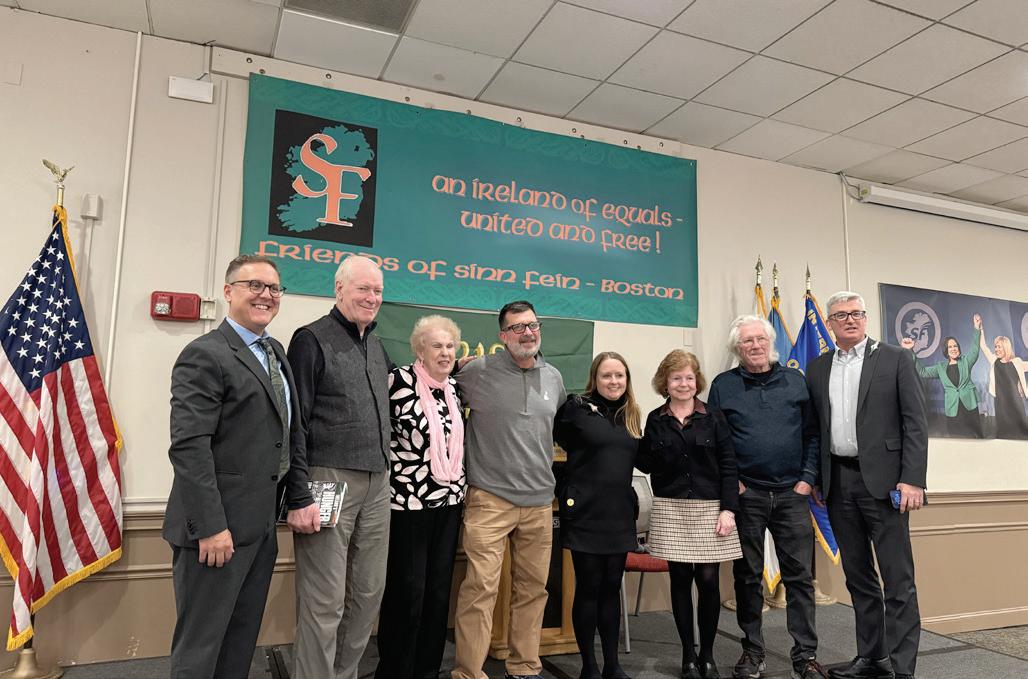
ByGregO’Loughlin
Friends of Sinn Féin hosted a series of three Irish Unity People’s Assemblies for the Diaspora in the Northeast of the United States in late October. These were the ninth, tenth, and eleventh Irish Unity People’s Assemblies organized across the US over the last year, which drew more than 1,100 people in attendance from coast to coast. Previous events featured Sinn Féin speakers Pat Cullen MP, John Finucane MP, and Dara Hughes MP, with stops in Cleveland, OH; Columbus, OH; Pearl River, NY; Washington, DC; Cincinnati, OH; Nashville, TN; Chicago, IL; and San Francisco, CA.
This run of events included stops in Hartford, CT; Boston, MA; and Philadelphia, PA. Special guest Mairéad Farrell, TD for Galway addressed hundreds of supporters and activists from all over the region.
Late autumn in New England can feel like a movie set. Vibrant foliage, fall festivals, pumpkin patches, and apple orchards abound as Mairéad made her way from city to city accompanied by Sinn Féin’s Representative to North America Ciarán Quinn and Friends of Sinn Féin’s Executive Director Greg O’Loughlin. The setting was bested only by the energy and engagement at every stop where the crowds that gathered jumped right into the work of planning and preparing for a new and united Ireland.
In Hartford, more than 150 activists gathered
at the Irish American Home Society to hear from Ms. Farrell and to work in small groups at their tables in order to make plans and organize action. A rare weekend afternoon event made it possible for families to participate, and featured pipers, a local Irish dance school, and a reception after the work to help solidify the connections made.
The fireside chat portion of the event was hosted by Tricia Mcivor, who led Miaréad through a series of questions that had been suggested by registrants. It was a highlight of the series, and it provided the audience with an opportunity to learn more about the role of activists in the work.
Later in the week, more than 100 people convened at the home of the Boston Firefighter’s Local 718, Florian Hall. Boston’s host for the fireside chat portion was none other than long-time activist and Irish Republican Kathleen Savage. Kathleen and Mairéad not only answered the many questions suggested by the attendees, but also worked their way through a myriad of topics and events that provided a special review of Boston’s long history of support.
Activists young and old jumped at the chance to discuss the actors and the work involved in creating a new and united Ireland and to make plans for next steps.
More than 100 people came out to
Philadelphia’s Commodore John Barry Arts and Cultural Irish Centre in spite of pouring rain and flood warnings. The room filled quickly and the warmth of the greetings and of the gathering quickly vanquished the cold, raw evening.
The fireside chat in Philadelphia was hosted by Terry Welsh, Pennsylvania’s Chair of the Ladies Ancient Order of Hibernians Freedom for All Ireland Committee and was a great conversation. Afterwards, attendees were eager to engage with the small group work and discussion questions. Philadelphia has been a center of Irish Republican activism in the United States for decades and the crowd was ready, willing, and able to dive into the deep end of organizing and next steps.
All of these events were made possible by the work of volunteer activists and supporters. The progress made and the work to be done on the horizon is clearer than ever and that is thanks to the dozens of volunteers, hosts, donors, and activists.
Plans for events next year are already underway. In the meantime, it is clearer than ever that Irish America is ready to work for a new and United Ireland and to be part of the generation that makes it happen!
Greg O’Loughlin, Executive Director, Friends of Sinn Féin

ByCiaranQuinn

I have just returned from attending Irish Unity Commission hearings in Hartford, Boston and Philadelphia. Over the past thirteen months, Friends of Sinn Féin USA has hosted eleven such events in cities across the USA, and Friends of Sinn Féin Canada has hosted four events in Montreal, Toronto, Ottawa and Vancouver.
The Commission events allow for activists and supporters to hear directly from Sinn Féin Representatives and to discuss the way forward to secure and win Irish Unity Referendums. One common factor across these events has been the need for the organisers to call a halt to the discussions as each event went over time. This is a measure of the interest and energy of activists hungry to see Irish Unity.
One question that arises in both North America and Ireland is, “Why do we put so much time and resources into these events?.”
It was fitting that the last Commission of the current year was held in Philadelphia, A city to which Wolfe Tone travelled in exile to meet and learn the lessons of American Revolutionary leaders. It was there that he made contact with the French Government Representatives and began his journey to Paris.
In each phase of Irish revolutionary history, North America has been crucial. There would have been no Easter Rising without “our exiled children.” Throughout the years of conflict, activists and supporters in Irish Northern Aid, the Hibernians, Clann na Gael and others stood on the side of justice and Irish Unity.
It was US and Canadian activists who campaigned in support of the McBride Principles and against endemic discrimination in the North of Ireland. As the peace process developed, US-based activists campaigned for a visa for Gerry Adams and for the appointment of a special envoy to the North as part of the 1992 Presidential campaign.
President Clinton upheld his campaign promises and remained engaged throughout the negotiations that would lead to the Good Friday Agreement. He took these actions despite British Government objections and set an era in which US foreign policy in Ireland would be independent of both governments, with peace and progress at its core.
The US and Canadian involvement in our peace process did not end in 1998. The GFA remains the most successful US foreign policy initiative in a generation. Each administration and both parties have remained engaged, acting as a guarantor for the agreement, peace and progress.
This became evident in the Brexit process, on a bipartisan basis, the US Congress voted that a trade agreement would not be progressed unless the Good Friday Agreement was protected and a hard border across
Ireland was avoided. A similar position was supported in the Canadian Federal parliament.
This focused the attention of the British Government, which returned to the negotiation table with the EU.
Every election cycle throws up new challenges and opportunities. We have a Labour Government in Westminster and a Fianna Fáil/ Fine Gael Government that are desperate to build relationships with the Trump White House and identify allies across the US political, economic and civic society. Both governments also oppose the implementation of the referendum commitments of the GFA.
The role of Sinn Féin in the US has been both as a partner in the peace process and a critical friend for the US political establishment. We work to protect the Good Friday agreement and promote the cause of Irish Unity. That does not mean that we support or endorse all U.S. foreign policy. We use our meetings to raise concerns and share our perspective on peacebuilding, most recently on the genocide in Gaza.
History demonstrates that the main driver for progress and Irish unity in the US and Canada will come from Irish Citizens and the wider diaspora.
The Irish Government has retained a superficial relationship with the diaspora. It will support Irish cultural projects in the US and Canada, promote Irish Government priorities, but not extend voting rights to the Irish abroad. It appears that you are a cherished part of the nation until you seek a voice in shaping the politics of the nation. Pull on the green jersey, be seen but not heard.
Yet the Irish in America and Canada have a role to play in shaping Irish, British and domestic policy.
The MacBride Principles campaign was met by British objections, Irish Government official ambivalence and unofficial opposition, which shaped the US White House and Congress positions. Yet the campaign built momentum across city councils, state houses, labour unions and Irish American civic society. In the end, it reshaped fair employment laws and practices in the North.
In every city we have visited, the demand from the floor has been simple. It is time to implement the referendum commitments in the Good Friday Agreement. It is time for the Irish Government to plan, prepare and advocate for Irish unity.
The Irish in North America now need to be heard.
Ciarán Quinn is Sinn Féin’s representative in North America

‘Dublin City Council votes to urge government to prepare for Irish unity’ – trumpeted TheJournal.ie, as the largest local authority on the island called on the Irish government to establish an all-island Citizens’ Assembly and a Joint Oireachtas Committee on Irish Unity. September’s Council meeting also urged the government to plan towards Irish Unity and secure a date for referenda on reunification.
That a major media outlet would give prominent coverage to a Council motion that was merely reflecting the Council’s political opinion is unusual. Monthly, councils across Ireland pass aspirational motions calling on Government Departments and other public bodies to commit resources and support to many, many projects. Such nonbinding motions are usually ignored or at best warrant some minor local media coverage.
However, here was Ireland’s flagship Council debating the merits of a United Ireland, and by an overwhelming majority – only one Councillor refused support it –Councillors from across the political spectrum called on the Irish Government to prepare for Unity.
As was obvious during the recent Presidential campaign, this is one example of how far the Unity debate has moved to the centre of political discourse. In the last couple of months alone, Meath, Cavan, Louth and Leitrim Councils alongside Dublin City Council have called on the Irish
Government to step up and prepare for Unity and you can expect other councils to soon join them.

Advancing the debate even further, both Fermanagh & Omagh and MidUlster District Councils have not only agreed but amplified that call for a Citizens’ Assembly, by establishing formal working groups to examine the impacts of constitutional change on this island. The work of these Council groups will include engaging with their respective communities and mirror the positive work relating to Irish Unity already being carried out by Derry & Strabane District Council.
The Councils have become another platform to advocate and advance the debate.
And that’s important, because for many citizens, their Council and its Councillors are very prominent and influential within their community. Many people have a relationship with their local Councillor. Therefore, to hear their local Councillors and Council promoting Irish Unity is impactful.
Of course, their primary workload relates to everyday living - housing, planning, social supports or community needs and the likebut their standing as a Councillor makes them powerful advocates for Irish Unity.
So, the role of our Sinn Féin Council Groups and individual Councillors has never been more important in promoting our primary objective of Unity both inside the Council chamber and within the wider electoral area they represent.
Recognising that, Sinn Féin’s Uniting Ireland Committee, along with our Commission on the Future of Ireland, has planned a programme of work regarding Irish Unity, with our Council Groups and Councillors in tandem with the party’s National Councillors Forum. The focus will be to make Irish Unity relevant in as many aspects of their council work as possible. This includes motions promoting various aspects of Irish Unity being debated in Council chambers, a prominent role for our Councillors within Irish Unity activities organised by local Sinn Féin structures as well as focused work with our Councillors who sit on multiple cross-border bodies such as the Dublin-Belfast Economic Corridor or the NW Regional Development Group.
This work will be steady and incremental but as seen in recent weeks, debates around motions on Irish Unity and the need for a Citizens’ Assembly have been passed on multiple councils bringing the discussion further into our local communities.
And the need to reform, enhance and empower local government in the New Republic? That’s an article for another day.
Chris
MacManus - Former Councillor & MEP and currently Local Government Coordinator for the Uniting Ireland Committee
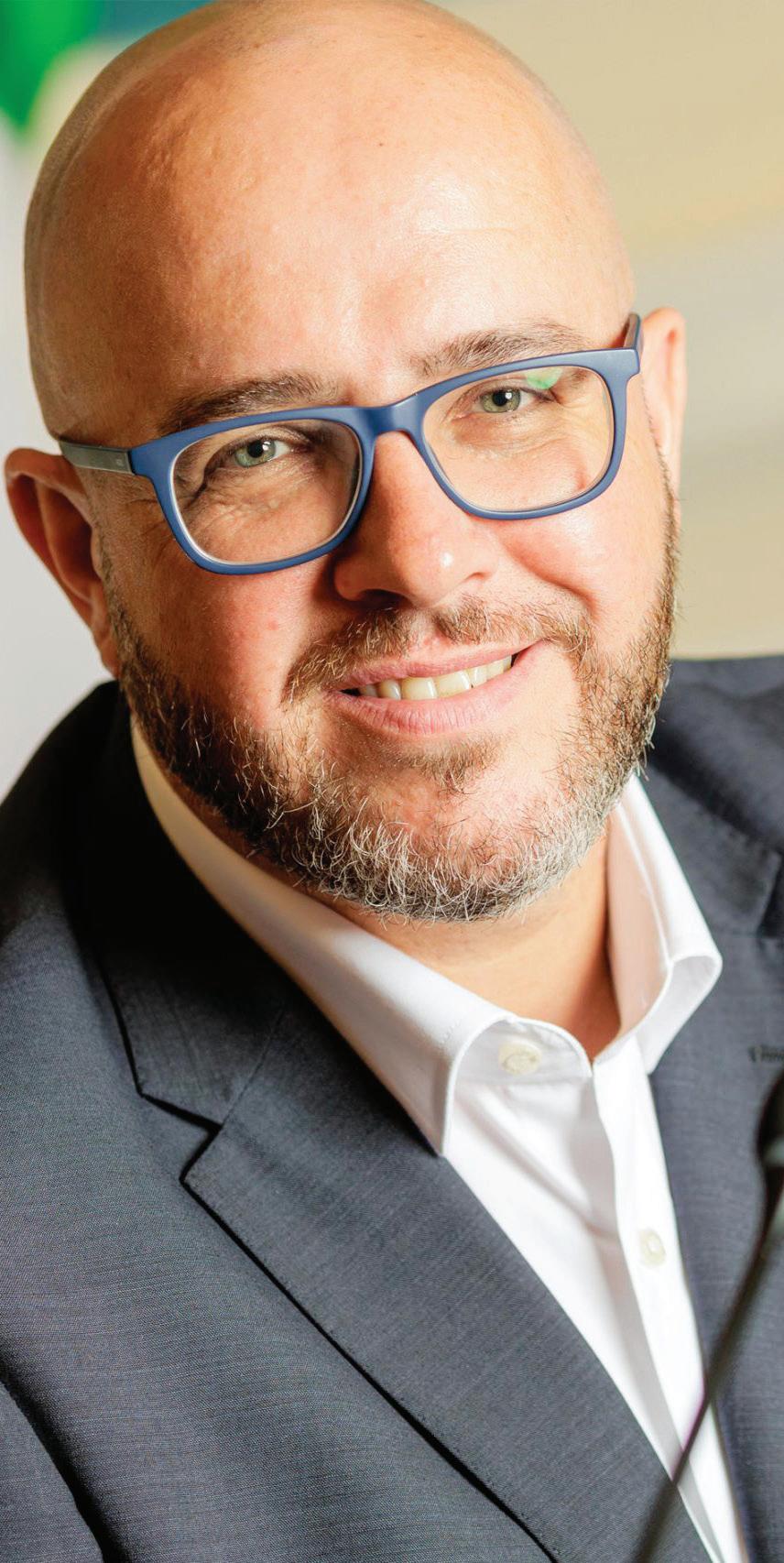

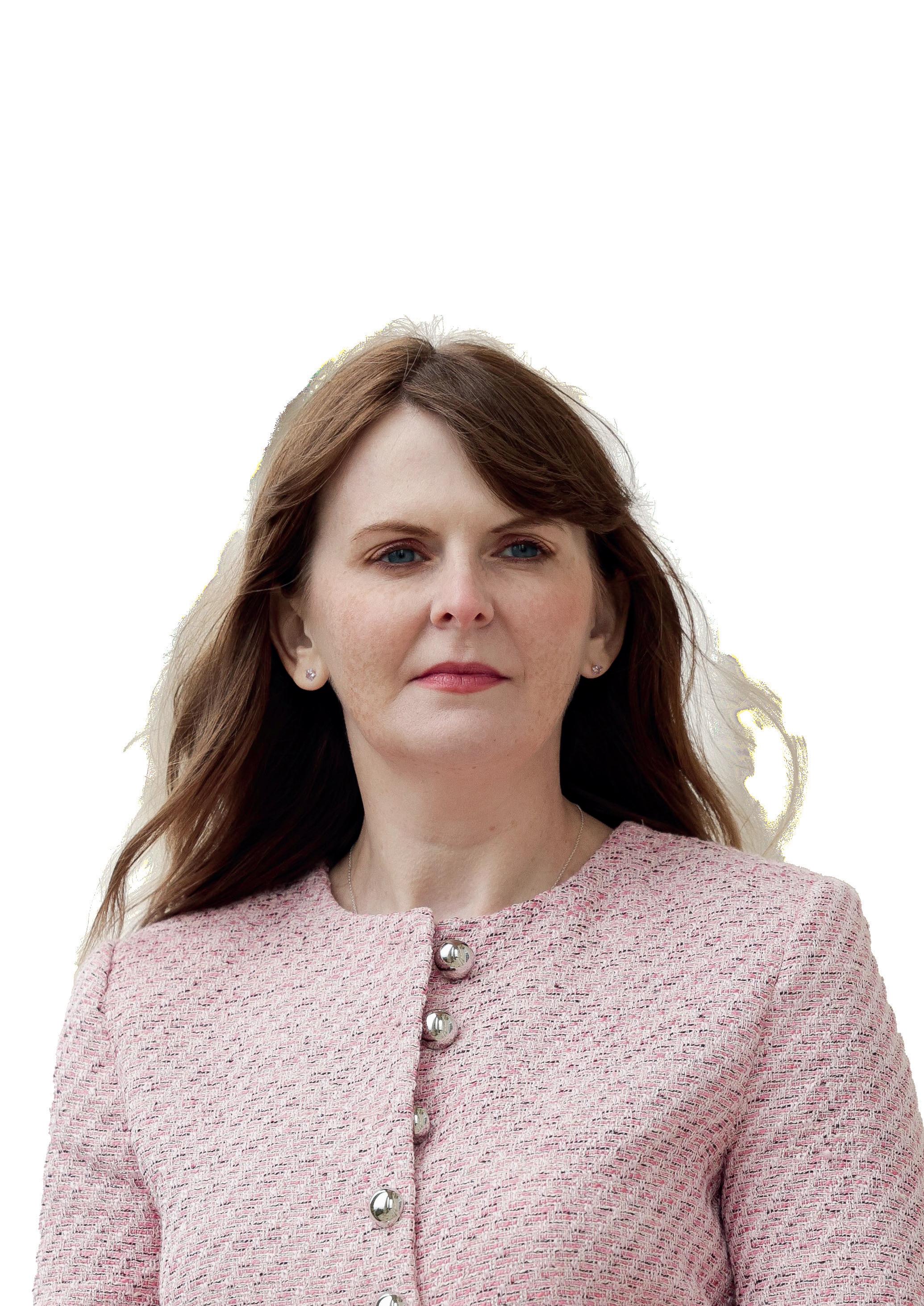
In a recent address to the Institute of International and European Affairs in Dublin the Minister for the Economy in the Executive Caoimhe Archibald MLA called on the Irish government to take the lead in preparing for Irish Unity.
At a time when there is a growing momentum for constitutional change that integrates and elevates the all-Ireland economy
the Sinn Féin Minister gave a keynote speech addressing the imperative of developing a new all-Ireland Economic Programme.
Caoimhe Archibald said such a new programme must diversify Ireland’s international markets, better invest the benefits of economic growth for the long-term good of society, and plan for economic reunification.
She reiterated Sinn Féin’s call for the Irish Government to start planning for reunification and said: “The Irish Government needs to lead. We need Citizen Assemblies without delay to give people their say in that planning. We need a plan to harmonise our tax and social security systems, our employment laws, our currencies, and our public services, in a planned and structured manner.”
She added that reunification would provide “a real opportunity that must not be missed to shape the future of the economy on this island in a way that serves the entire island.”
Ms Archibald’s address in full:
“In 1958 Thomas Kenneth Whitaker, a civil servant in the Department of Finance, prepared a submission for the Irish Government. The paper identified the state’s key economic weaknesses and outlined a new model based on integration into the global economy, openness to international capital, and a focus on high-productivity industries and exports.
A condensed version of the paper called Programme for Economic Expansion was published later that year. The model outlined by Whitaker came to form the economic consensus of the state. In some respects, it has been extraordinarily successful, delivering unprecedented levels of economic growth.
However, a new Economic Programme is now required. One which is capable of attracting widespread consensus, which can create a strong, resilient and fairer economy; and which takes into account new realities.
One of those realities is America’s swing to protectionism. This has starkly highlighted the danger of being overly reliant on one market. Three US firms account for almost 40% of the state’s Corporation Tax revenue - US firms accounting for 75% of that revenue.
So we need to develop new markets, and importantly focus more on growing small, domestic businesses capable of competing internationally. Because it remains the case that as a small island economy we can only prosper as part of the broader global economy.
A new economic model must also ensure that the benefits of growth are better invested for the long-term good of society. Failures around housing and poverty have created social tension and discontent, and provided all too fertile ground for far-right politics.
Critically, a new Economic Programme must address the gathering momentum for constitutional change. It must be a truly national plan, a plan to integrate and elevate the all-Ireland economy.
Interestingly it was another former civil servant who in the 1990s, attempted to create the modern consensus around the all-Ireland economy. In a speech delivered in Dublin in 1992 Sir George Quigley argued that Ireland should function as a single economic entity, and called for a particular focus on developing the Belfast
to Dublin corridor.
Following the creation of the EU single market, and the establishment of the cross-border institutions under the Good Friday Agreement, all-Ireland trade has flourished. Remarkably, cross-border trade has more than doubled since 2020, and the Executive and Irish government are co-operating well to build on this organic growth.
Funding has been increased for Intertrade Ireland, which supports cross-border trade on the island, and for Tourism Ireland, which markets the island internationally as a single unit. In February 2024, the Irish Government announced €30m of Shared Island funding for a new all-Ireland Enterprise Scheme.
Later that year Enterprise Ireland, the IDA, and Invest NI collaborated on the first all-Ireland Trade Mission to Singapore. However, barriers remain. On this small island we have two different tax systems, and now two different tariff regimes for exporting to the US. As a result of Brexit the North has been pulled out of the EU single market for services, and denied full access to EU labour. Access to talent is a key issue for businesses and on such a small island it is critical that people can work as seamlessly as possible across the country.
However, as highlighted in a recent study commissioned by the Shared Island Working Group, there are a range of difficulties facing people who live on one side of the border but want to work on the other side. Complications in relation to payroll and taxation have a knock-on effect on issues such as social security entitlements, pensions, and mortgage applications.
These difficulties have been exacerbated by the rise of remote working, as more people are employed in one jurisdiction but work from their home in the other.
These frictions have a particularly strong impact on border areas, which are at the edge of two economies rather than at the heart of an all-Ireland economy. As a result of partition, decisions made in London continue to impact on the north, and on the operation of the all-Ireland economy.
Britain’s economy has long been characterized by low productivity and low growth. Its decline has been reinforced by policies of economic self-harm such as deindustrialization, austerity, and Brexit.
Since coming into power, the Labour Government has continued to pursue economically damaging policies – hiking employers’ national insurance contributions, prioritising spending on the military instead of rebuilding public services and infrastructure, and continuing with the Tory’s Electronic Travel Authorisation scheme to the detriment of our all-Ireland tourism sector.
The economic failures of the Conservative and Labour are such that the possibility of a Nigel Farage-led government is now being talked about. This makes it all the more critical for the north to chart its own economic path.
Last year Sinn Féin took control of the Economy Department in the north for the first time. We have brought a clear strategic focus. The Department’s policies and resources are being recalibrated in line with four key objectives. These are:
• To increase productivity – for example by using dual market access to grow our exports, by prioritizing the development of seven high-productivity sectors and by investing in skills.
• To create Good Jobs – by strengthening Trade Unions and workers rights.
• To promote Regional Balance – by setting, for the first time, a regional investment target and by creating Local Economic Partnerships to develop localised economic plans and support indigenous businesses.
• And to achieve Net Zero – by incentivising renewable energy generation.
Recently our economy has been out-performing Britain, both in terms of overall economic growth and in terms of exports. But it is only through reunification that we can really take control of our economic destiny, and realise the full benefits of the allIreland economy.
Economic modelling by Professor Kurt Hubner forecast that the growth unleashed by reunification would quickly eliminate the fiscal deficit, creating substantial net gains for both parts of the island and particularly for the north.
Professor John Doyle of DCU recently published a paper with a similar conclusion. He estimates that the economic growth generated by unity would eliminate the subvention within five to nine years.
History shows that economic unification can be achieved very quickly. Within a year of the Berlin Wall falling, and with virtually no preparation, Germany unified two economies which couldn’t have been more different.
A capitalist and a command economy, which belonged to two
different trading blocs, with currencies that weren’t even traded with each other, and with a huge disparity in infrastructure and living standards.
The reunification of Ireland does not involve anything like the same challenges. Our economies are similar, and already highly integrated. Sterling and the euro area are already traded and are easily convertible. The whole of Ireland is already in the EU single market for goods. And the scale of the difference in living standards and infrastructure is much less in Ireland.
So the two economies could be quickly and completely merged. Nevertheless, we want unification to be as seamless and successful as possible.
So there must be preparation and planning, and the Irish Government needs to lead on that. We need Citizen Assemblies without delay to give people their say in that planning.
We need a plan to harmonise our tax and social security systems, our employment laws, our currencies, and our public services, in a planned and structured manner.
Undoubtedly there are significant challenges and economic headwinds at this time.
But we have a real opportunity that must not be missed to shape the future of the economy on this island in a way that serves the entire island.
To create a strong, resilient and fair economy, that supports innovation, creativity and entrepreneurial spirit to deliver greater prosperity for all people and communities.

We have a real opportunity that must not be missed to shape the future of the economy on this island in a way that serves the entire island.

ByRoyGreenslade
The increasingly hysterical campaign within Britain to withdraw from the European Convention of Human Rights (ECHR) spells imminent danger for the Good Friday Agreement (GFA).
It may not be a surprise that the Conservative party leader, Kemi Badenoch, has decided to follow Nigel Farage’s Reform UK by announcing that she would withdraw if her party wins the next general election. But her move followed worrying signs that the ECHR may also come under attack within the Labour party. Two of its former home secretaries, Lord (David) Blunkett and Jack Straw, have opened fire on the convention.
First, Blunkett floated the radical, and disturbing, idea of Britain temporarily suspending the ECHR in order to jettison migrants. Then came Straw’s intervention, which was much more significant because he was the architect of the Human Rights Act which incorporated the ECHR into British law in 1998. Just as importantly, he was in cabinet when the GFA was negotiated. His new scepticism towards the ECHR relates directly to a recent claim that withdrawal would not affect the agreement. Straw was supporting a report issued by a right-wing think tank, Policy Exchange, which stated that nothing in the British state’s commitment to the Irish peace process requires it to remain a part of the ECHR.
“In choosing to exercise the UK’s right to withdraw from the ECHR,”, says the report, “a future government would neither be flouting the UK’s international obligations under the Belfast Agreement nor failing to respect the political settlement that grounds the peace process.”
One of its authors, Professor Richard Ekins, said: “Neither the letter nor the spirit of the Belfast Agreement in any way requires the UK, or Ireland, to remain within the ECHR.” He argued that public debate about human rights has been “distorted” by the repeated assertion that ECHR withdrawal would breach the GFA.
In a somewhat convoluted endorsement of Ekins’s argument Straw was quoted as saying: “Whatever the merits of UK withdrawal from the ECHR, nothing in the Belfast Agreement rules it out as a viable course of action.”
As with Ekins, he offered no evidence for his assertion. But we need to view Straw’s view in the context of his recent contention that British courts should supplant the Strasbourg court of justice when ruling on “everyday asylum issues.”
It is clear evidence that, in company with Blunkett and several other Labour party members, including members of the government, Straw is being pulled to the right by Reform UK’s electoral success. And that political slippery slope appears to be gathering speed.
Badenoch based her decision to withdraw on legal advice from the shadow attorney General, Lord Wolfson. Like Ekins, he simply asserts that the GFA will not be breached by withdrawal. As with Brexit, little thought has been paid to the effect on the peace process.
Straw believes the Policy Exchange paper “helps to clear the ground” for a debate about amendments to the ECHR. A much more concerning effect of his statement is its potential to stimulate a debate about the need to amend the GFA. That would bolster those within the north who have never been reconciled to the GFA’s permanence.
Needless to say, one of them – the TUV leader, Jim Allister – was quick to welcome the report, which he praised for its “careful and detailed analysis.” In fact, there was no detail whatsoever. Predictably, Straw’s support for the think tank paper was greeted warmly in headlines in newspapers such as The Times – which gave it top page one billing – the Sun, Daily Telegraph, and Daily Mail.
This right-wing press support accepted the Ekins report at face value, neglecting to inform readers of the weight of orthodox opinion which counters his cavalier claim.
For example, one the most informed commentators, Catherine Barnard, a professor of EU law at Cambridge University, argues that peace in the north is underpinned by Britain’s ECHR
membership.
That’s the view also of Grainne Teggart, deputy director of Amnesty International’s Northern Ireland branch. To repudiate the ECHR, she said, “would be a serious breach of international law… a step no government should ever contemplate.”
For her, the convention is the cornerstone of the GFA, which is “a bilateral international treaty between the UK and Ireland. The UK cannot walk away from these treaty obligations.”
Indeed, the same point was made by an unidentified British government spokesperson quoted, albeit in passing, in some of the newspaper coverage.
Given that the GFA was underwritten by referendums on each side of the border, Farage’s call for it to be renegotiated is a foolish notion.
His demand reveals a reality his bluster cannot disguise. The ECHR is key to the GFA’s existence. “In 30 pages,” says Naomi Smith, chief executive of a British campaign group lobbying for closer ties with the EU, “the Good Friday Agreement cites the ECHR seven times as an essential safeguard.”
If Britain was to unilaterally leave the ECHR, it would deny people in the north the right to a final appeal to the Strasbourg court. It would also destroy the key principle of equivalence between citizens on either side of the border.
However, should Britain dare to take that step, there could be a substantial silver lining which may not have struck advocates of withdrawal. In order to extricate itself from its treaty obligation, it could be argued that a new referendum would be necessary. And that would, in effect, amount to a border poll.
Roy Greenslade
Author: Goodbye to the Working Class (1976), Maxwell’s Fall (1992), Press Gang (2003), The Peer, the Priests and the Press (2023), Rogues: Rupert Murdoch and Mazher ‘Fake Sheikh’ Mahmood (forthcoming 2025)
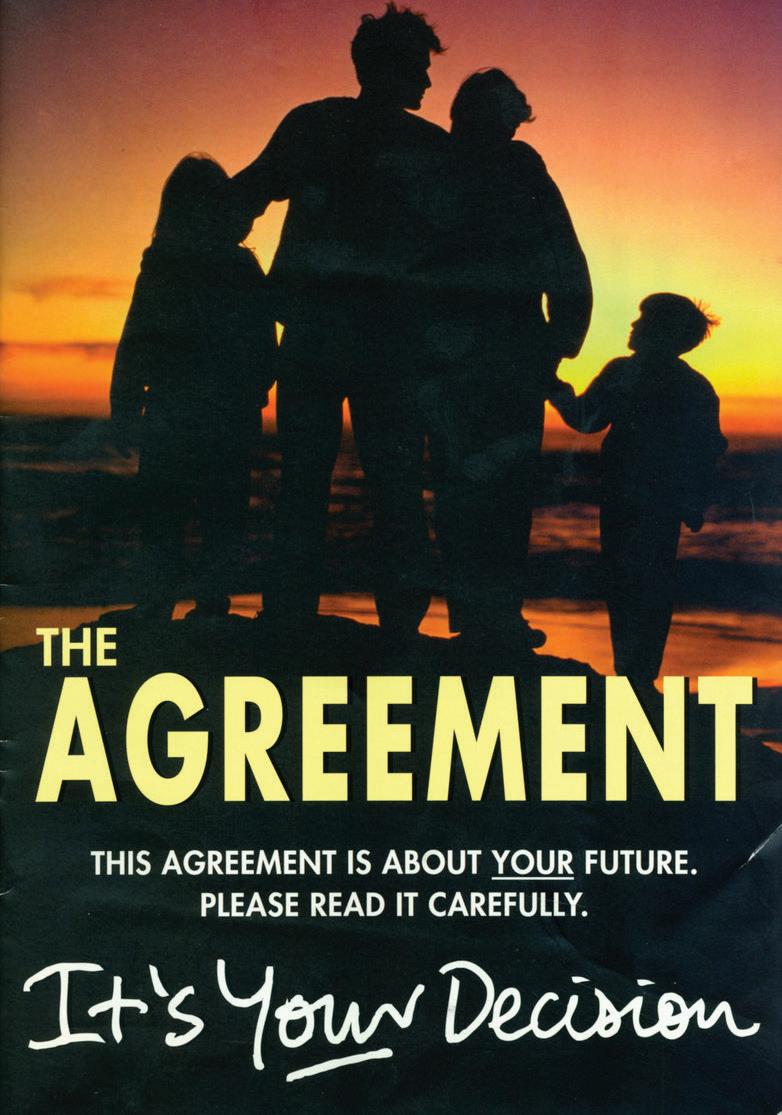
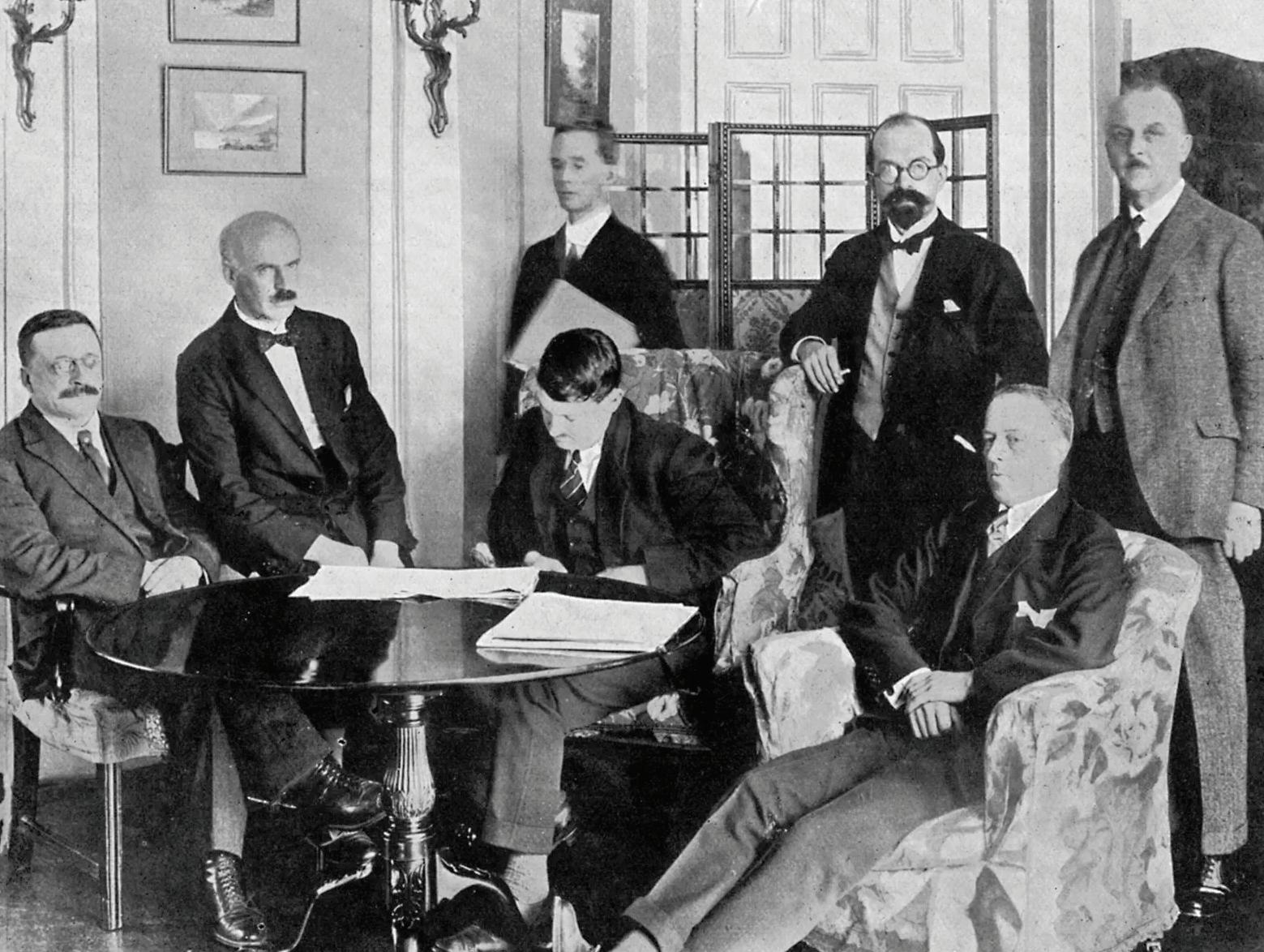
ByChrisTurley
The Anglo-Irish Treaty of 1921 continues to cast a long shadow over Irish political life. The negotiations, which culminated in the signing of the Treaty, not only divided a movement but defined the constitutional trajectory of the island for over a century. As we potentially once again approach a moment of historic choice—driven by shifting political majorities, demographic change, and renewed debate over Irish unity—it is worth revisiting the lessons of 1921: not as nostalgia, but as instruction.
THE FLAWED TREATY NEGOTIATIONS
The Treaty delegation sent to London in October 1921 embodied both the hopes and the contradictions of the Irish revolutionary movement. Historian Gretchen Friemann has described how “the Irish team went to London divided in purpose and unequal in experience; by the end, they were exhausted and isolated” (The Treaty, 2021, p. 164). This imbalance proved decisive. The negotiating team of Arthur Griffith, Michael Collins, and their colleagues were authorised to negotiate but not to conclude an agreement without consulting the Dáil or the cabinet. Yet under intense pressure from Lloyd George, they signed. “Lloyd George was never negotiating for Irish freedom,” Friemann observes, “he was negotiating for British security” (p. 82). It was a British government doing what British government’s always do – prioritise British National interests over all other considerations.
The British strategy was clear: to secure imperial defence, trade, and stability through limited Irish autonomy, while ensuring partition as a permanent safeguard. The Irish negotiators faced a seasoned empire whose methods were honed through decades of colonial diplomacy. The decision to sign without reference to the Dáil was not simply an error of judgment; it was, in effect, the acceptance of British framing, with consequences that reverberate to this day.
BRITAIN’S INTERESTS AND THE LEGACY OF PARTITION
The Treaty’s acceptance of partition entrenched division. As Cormac Moore has written, “Partition was not an accident of diplomacy but the logical outcome of Britain’s long policy of divide and rule” (Birth of the Border, 2019, p. 14). The new border created two states but no reconciliation. Britain’s primary concern was not the will of the Irish people but the strategic containment of republicanism and the preservation of imperial order.
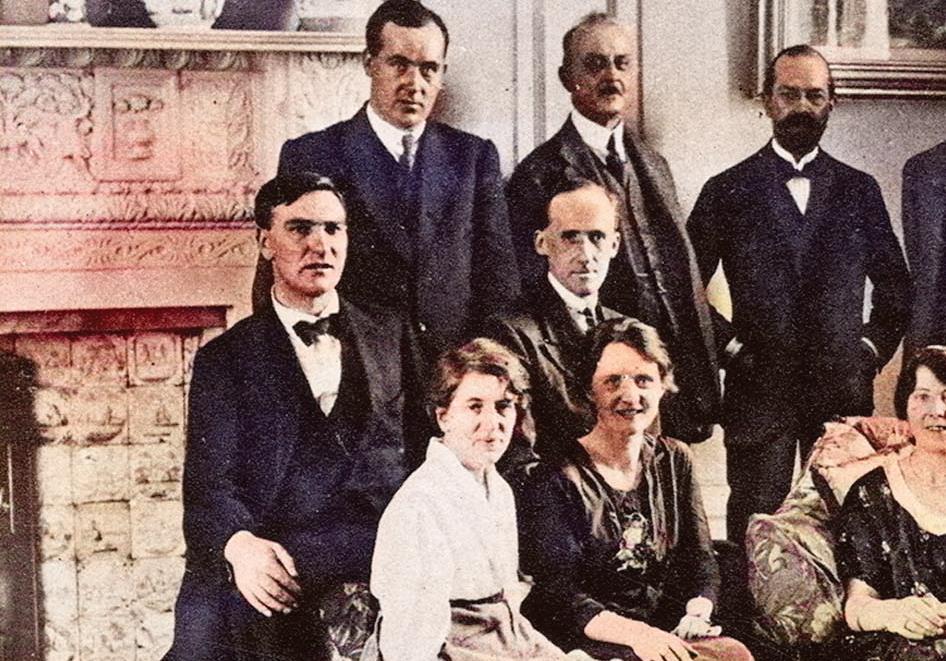
warned that partition would mean “a carnival of reaction both North and South, the capitalist and the cleric triumphant, and the working class disinherited.” His words remain prophetic. The structures born of partition reinforced sectarianism, and inequality, challenges that still shape the political landscape.
FROM HOME RULE TO THE GOVERNMENT OF IRELAND ACT
The Treaty must also be read as the culmination of earlier failures. The Home Rule Bills of the late nineteenth and early twentieth centuries revealed Britain’s consistent aim: to grant reform only when it secured British national interests. The 1920 Government of Ireland Act confirmed that Westminster intended to partition the island long before the Treaty.
Diarmaid Ferriter notes that, “British governments consistently prioritised their own cohesion over Ireland’s unity, ensuring any measure of self-government served imperial ends” (The Border, 2019, p. 36). The same pattern would later reappear in negotiations from Sunningdale to the Anglo-Irish Agreement, and again in the 1990s peace process. In each instance, Britain’s primary objective was the management, not the resolution of the Irish question.
NEGOTIATING THEN AND NOW
History never repeats exactly, but its rhythms echo. In 1921, Irish representatives faced the challenge of negotiating from weakness, under time pressure, against an empire skilled in constitutional compromise. Today, the dynamic has shifted. The British state is no longer imperial, and Ireland is no longer peripheral. Sinn Féin’s task, and that of all advocates of Irish unity, is to prepare the ground for informed, inclusive, and strategic conversations in the lead up to any ‘Border poll’. The Irish government must be an active participant, not a cautious observer. The coming years demand not rhetoric but readiness: constitutional planning, civic dialogue, and alliances that extend beyond party or tradition.
REACHING BEYOND THE REPUBLICAN TRADITION
today’s challenge is to unite a people divided by history but linked by future prosperity in a new Ireland. The call for unity must transcend the green and orange binaries that Britain has exploited. As Ferriter observes, “The Good Friday Agreement replaced coercion with consent, but it did not end the unfinished business of Irish sovereignty” (p. 197). That unfinished business requires a new consensus, one grounded in equality, reconciliation, and shared prosperity.
Engaging with unionism and those of a British identity is central to that project. The republican argument for unity must appeal not only to history but to practicality: better governance, stronger public services, economic opportunity, and dignity for all traditions. As Uachtarán Shinn Féin Mary Lou McDonald MLA recently said, “Irish unity cannot be built on flags and anthems; it must be built on fairness, equality, and the everyday needs of citizens.”
Over the past decade, Sinn Féin has emerged as the dominant all-Ireland political party, transforming republicanism from the margins of protest to the centre of governance. Its rise is not accidental but the product of strategy, perseverance, and social connection. The party’s electoral breakthroughs—in the North, where Michelle O’Neill now serves as First Minister, and Mary Lou leads the opposition in the Oireachtas, reflect a profound shift in Irish political consciousness.
Where once partition defined political possibility, Sinn Féin now articulates a vision of shared sovereignty and civic equality. The party’s success has normalised the conversation about unity, placing it at the heart of mainstream political debate. Cormac Moore’s observation that “partition created two conservative states that looked inward” (2019, p. 188) highlights how significant this shift has been: republicans have opened those states outward, towards cooperation, inclusion, and
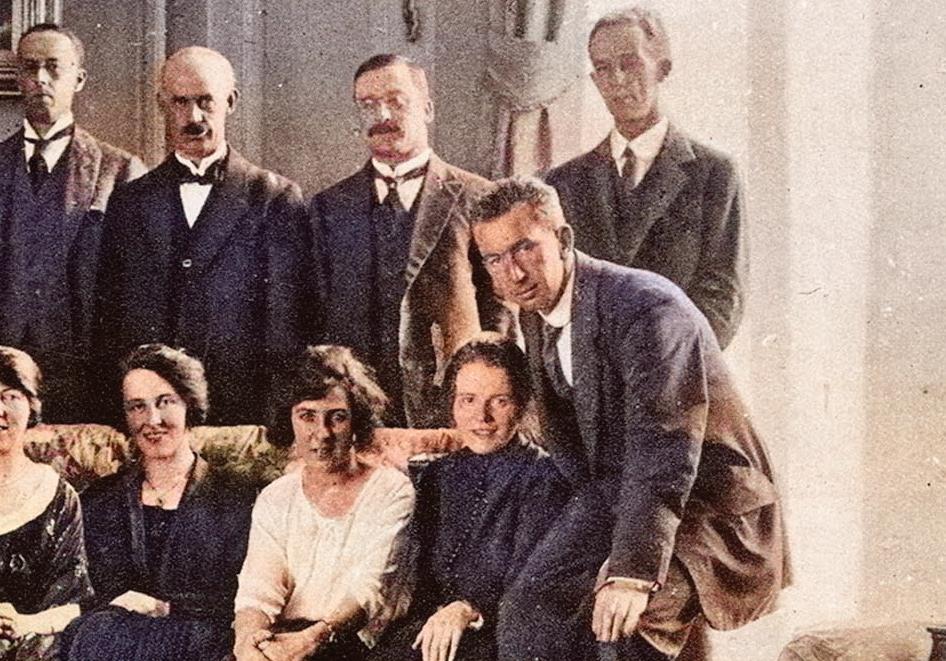
Parallel to Sinn Féin’s political advance has been the growth of civic activism on Unity, most visibly through Ireland’s Future, Trade Unionists for Irish Unity and Independence (TUIUI), The Ireland Podcast, Think 32 and others, including individual commentators, as well as the SDLP’s New Ireland Commission. These have become important platforms for dialogue—bringing together artists, trade unionists, academics, and ordinary citizens to explore the constitutional and social dimensions of unity. Their events, publications, and conferences have shifted the unity conversation from aspiration to preparation, articulating a vision of change that belongs to all the people of Ireland, not any single party.
Britain’s historic involvement in Ireland has always been guided by self-interest. As Charles Townshend put it, “From the Act of Union to the Troubles, Britain’s involvement in Ireland was guided by calculation, not conscience” (The British State and the Irish Rebellion, 2013, p. 89). Understanding this is not about dwelling on grievance but learning from history. Future negotiations must be conducted on the basis of parity, not dependency, and framed by the principle of national selfdetermination, not British benevolence.
The vision of a new Ireland must move beyond the narrow terms of the 1921 Treaty. Unity is not simply the erasure of a border—it is the creation of a republic of equals. The election of Catherine Connolly as Uachtarán na hÉireann demonstrates that by creating alliances and collective partnership substantial political change can happen. Her presidency demonstrates how far Ireland has travelled since the Treaty debates, when women’s voices were marginalised and equality deferred. It is also further evidence that the grip of Fine Gael and Fianna Fail on the electorate is diminishing with their political hegemony.
work left unfinished in 1921. Building alliances across social and political lines, engaging the unionist community with respect, and ensuring that both governments prioritise unity as a shared national project—these are the tasks ahead.
A century ago, partition defined the outworking of the Treaty and the Civil War. Today, conviction and cooperation must define the future. From the Treaty to unity, the lesson is clear: the Republic will not be given, it must be worked for. As Martin McGuinness said; “The future of Ireland belongs to the people of this island alone. It is not a gift to be given by any British government—it is a right to be exercised by the Irish people.” (McGuinness, 2013).
Suggested Reading
Connolly, James. Labour in Irish History (Dublin, 1910).
Ferriter, Diarmaid. The Border: The Legacy of a Century of AngloIrish Politics (London, 2019).
Friemann, Gretchen. The Treaty: The Gripping Story of the Negotiations that Brought About Irish Independence and Led to the Civil War (Dublin, 2021).
Moore, Cormac. Birth of the Border: The Impact of Partition in Ireland (Dublin, 2019).
Townshend, Charles. The British State and the Irish Rebellion (Oxford, 2013).
Ward, Margaret. Fearless Women: Hanna Sheehy Skeffington, Feminism and the Irish Revolution (Dublin, 2019).
Chris Turley is a long standing Sinn Féin and community activist in west Belfast. He graduated from Queen’s University this year with a BA Honours in History and Politics.
“The North will never get the money it needs from broke Britain”- Brian Feeney, Irish News 7th July 2025
“A United Ireland in Europe is our route out of perpetual stagnation” - Barry White, Irish News 14th August 2025
“My political instinct is to support a United Ireland” - Nicola Sturgeon, Former Scottish First Minister 21st August 2025
“Conversations around a new Ireland are taking place among unionists despite the ‘gatekeepers’ of unionism telling us that they are not.” - Claire Mitchel, 31st of August 2025 at a Féile Belfast event on Creating a new Ireland and the Protestant perspective
“I keep getting told these conversations aren’t happening, or people from unionist or loyalist areas aren’t interested in these conversations (about a united Ireland), but then I’ve been in conversations with people who are unionist for the past five years. So there’s what gets said and then there is the reality.” - Colin Harvey, QUB, 31st of August 2025 at a Féile Belfast event on Creating a new Ireland and the Protestant perspective
“Here in our own country, we will soon have an important public debate in the run up to the election of our next president. Sadly, though I am told I am an Irish Citizen, and even though I have deeply treasured that identity since I was a child, even in the face of violent opposition, I am not entitled to vote in that election” - Fr Timothy Bartlett, 2nd of September speaking to a mass in Knock shrine
“I believe a New Ireland is where the future lies” - Ex-Loyalist David Adams, 16th September 2025
Irish unification can offer ‘new rising tide of energy and momentum’. Unification offers the opportunity for everyone, north and south and east and west, “to put all our genius and our hopes and our aspirations and our problems together, and try to solve them together. Life will reveal itself to us in an entirely new and an entirely wonderful way, in a way that offers real pride and hope to the children of the next generation in a way that others were deprived of because we were too narrow,” - Former president Mary McAleese October 2nd 2025 at the launch of Ben Collins book, The Irish Unity Dividend.
“Nigel Farage has spoken about saving money and he could easily target Northern Ireland’s £15 bn subvention, while he’s also said that he expects there to be a united Ireland in the future – he could call a border poll at short notice just to sow dissent and chaos. Combined with his rhetoric on immigration and on lots of other issues, I think encourages people to increasingly see Britain as a place apart, and to explore if the future lies more on this this island.” - Ben Collins 2nd of October, 2025
ByAoifeFerguson
Ireland is changing, in the North a new generation has emerged since the Good Friday Agreement - vibrant, creative, progressive. They are the leaders in arts, in culture, and in the revival of the Irish Language. They want us to move beyond division and build a new Ireland. They look to us for leadership, inclusion and action, and we must not let them down” - Catherine Connolly, 2nd October 2025, during the presidential campaign.
“There will always be people who are not reconciled for one reason or another but that doesn’t mean we shouldn’t pursue it. I don’t think we should put up an artificial barrier towards a border poll.” - Leo Varadkar 4th October 2025 on BBC Sounds Borderland Podcast
“A united Ireland must also be a shared Ireland - one that cherishes every person, whether they identify as nationalist, unionist or neither. It is not about victory for one side, but partnership between all. … The next chapter of the Irish story will be written together - and I will do all in my power to help bring that future into being” - Newly elected Uachtaráin na hÉireann Catherine Connolly, 11th of October 2025
“I think it would be helpful for the Secretary of State to set out what the conditions for a border poll would be” - Naomi Long Alliance leader, 15th October 2025
“United Ireland debate is increasingly loud - preparation cannot be deferred forever… The days of pretending the constitutional conversation is not happening are over. The alert observer will spot that civic/political mobilisation is underway. It is apparent, for example, that pro-union voices are doing the groundwork. The maturity and honesty to acknowledge personal preferences is part of the evolving dynamic.” - Colin Harvey 28th October 2025, Irish Times
“nobody is arguing there is an appetite for constitutional change” – British Secretary of State Hilary Benn speaking in Lisburn 5 November 2025, Belfast Telegraph.

Reviewed by Jim Gibney
Nicola Sturgeon served as First Minister of Scotland and leader of the Scottish National Party from 2014 to 2023. She was Deputy First Minister from 2007 to 2014 and Scotland’s Health Secretary from 2007 to 2012. She has been a member of the Scottish Parliament since its establishment in 1999.
When 16-year-old Nicola Sturgeon turned up on the doorstep of one of the leading figures in the Scottish National Party (SNP) Kay Ullrich, little did she know that she was on the first rung of a ladder that would take her to the highest political office in Scottish politics – First Minster of Scotland’s government.
The year was 1986 and she was there to help Kay Ullrich get elected to the Westminster parliament. She was dressed for the occasion in jeans, Doc (Dr) Martens, and a donkey jacket with the ubiquitous CND badge, defining a generation favouring nuclear disarmament.
Nicola Sturgeon was all set for ‘chapping’ in Scottish parlance, better known here as ‘canvassing’. What brought her to the doorstep was her belief in Scottish independence. And it was that belief that was her lodestar that guided her for thirty-seven years through to her election as First Minister in 2014 and beyond.
Nicola blended her belief in independence with a rage about high levels of unemployment, poverty, industrial unrest, lack of hope for the future and a clash of values. This was a potent mixture requiring skilful management over time by the SNP at all levels.
In her autobiography ‘Frankly’ she provides a detailed political history of those years and the successes along the way as well as an engaging account of her personal journey.
In the first few pages of her fascinating book she itemises the successes.
Her career in frontline Scottish politics coincided with the “most momentous period in modern Scottish history.” She was a ‘front-row observer’ and an ‘active participant.’ As she writes: “I was in the room” through all of it.”
Nicola Sturgeon grew up and became politically active in the turbulent years of Margaret Thatcher’s leadership of the Conservative Party. She once said in an interview on BBC Radio that. “Thatcher was the motivation for my entire political career. I hated everything she stood for.”
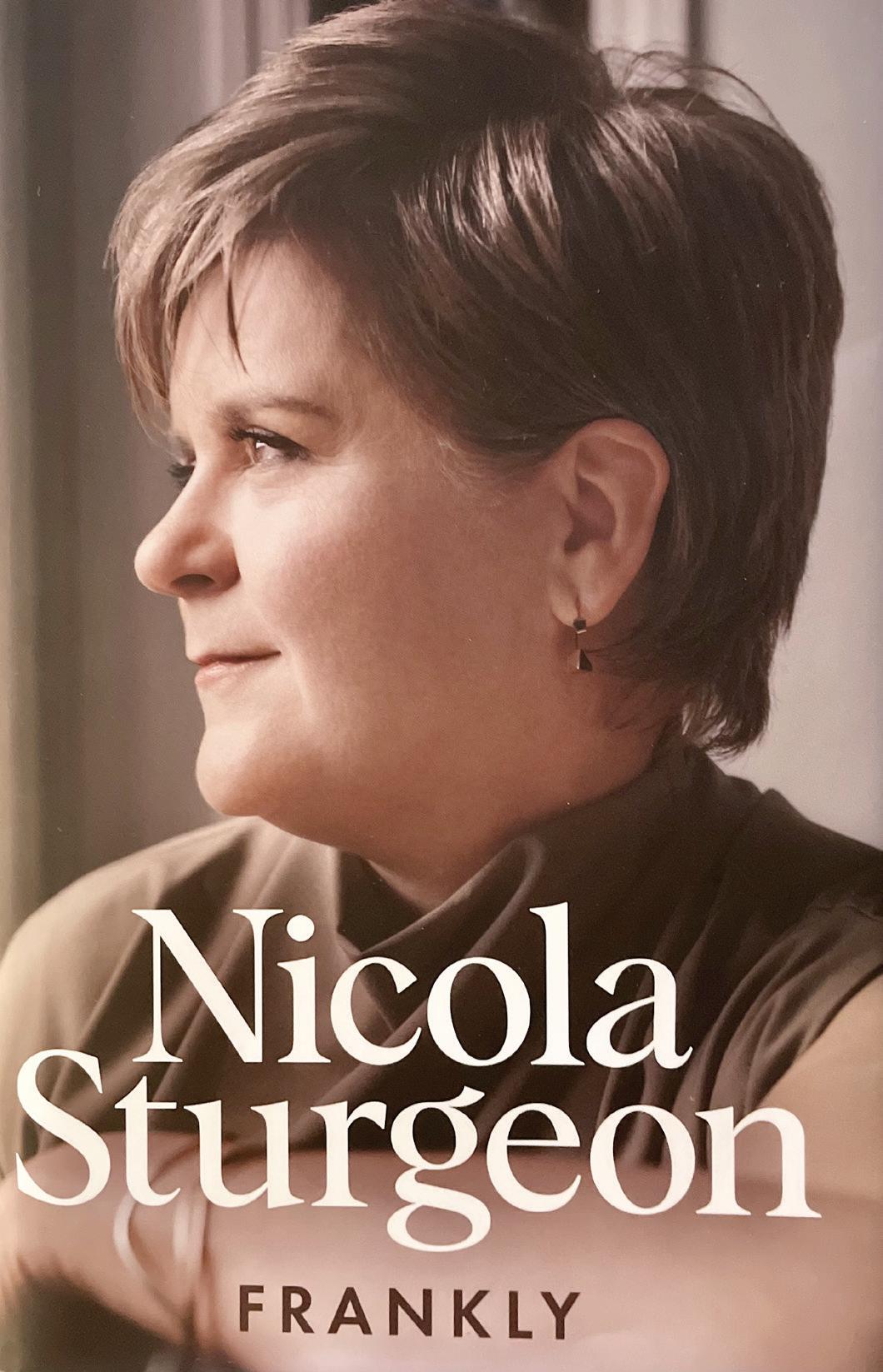
In 1992 she was the youngest candidate in Scotland in the British general election and was a candidate again in the general election in 1997 which saw Tony Blair win a landslide victory.
She campaigned in the 1997 referendum that led to the establishment of the Scottish parliament and became one of its inaugural members in 1999.
She was the Deputy First Minister and Health Secretary in the first ever SNP government and helped secure a landslide re-election for the SNP’s second term in government – negotiated the Edinburgh Agreement which paved the way for the independence referendum; co-authored, with Alex Salmond a 600-page independence document and was one of the key figures in the referendum campaign that brought Scotland to the brink of becoming an independent country.
She won all eight elections contested as SNP leader and led and won the campaign in Scotland against Brexit.
Nicola Sturgeon was the first woman to enter Bute House as First Minister and the first female Keeper of the Great Seal of Scotland in more than six hundred years. She led Scotland through the Covid pandemic, the “most traumatic and disruptive experience of our generation.”
One of the biggest challenges facing the SNP, its leader Alex Salmond and Sturgeon was the psychological state of the Scottish people in terms of their self-belief as a nation and the belief in their ability to build an independence movement capable of winning a referendum.
This is described in the book as “a chronic lack of national confidence” stemming from the military and political battlefields of history and the failure of Scotland’s soccer team to achieve its aims and infantilism that comes from a small country governed by a much larger neighbour.
The growth of the SNP and the joint leadership of it by Alex Salmond and Nicola Sturgeon turned that troubled national characteristic into a positive force which invested its confidence in both leaders and the SNP’s independence campaign.
The success of the SNP’s independence campaign was also linked to its move in the early 1980’s to embrace a progressive, left-wing view representing the people’s national, social and economic needs.
It built its party around the demand for independence; it was the reference point for its existence as a political party. This was plain to see as Nicola Sturgeon led the Scottish government and very effectively used being in government and in the Scottish parliament as a platform to demand independence.
She was a relentless campaigner inside parliament, in government and on the streets for Scottish independence.
The undertaking facing the SNP was monumental: strengthening the nation’s desire for independence; replacing Labour and the Conservatives with the SNP and convincing the British government to hold a referendum on Scottish independence.
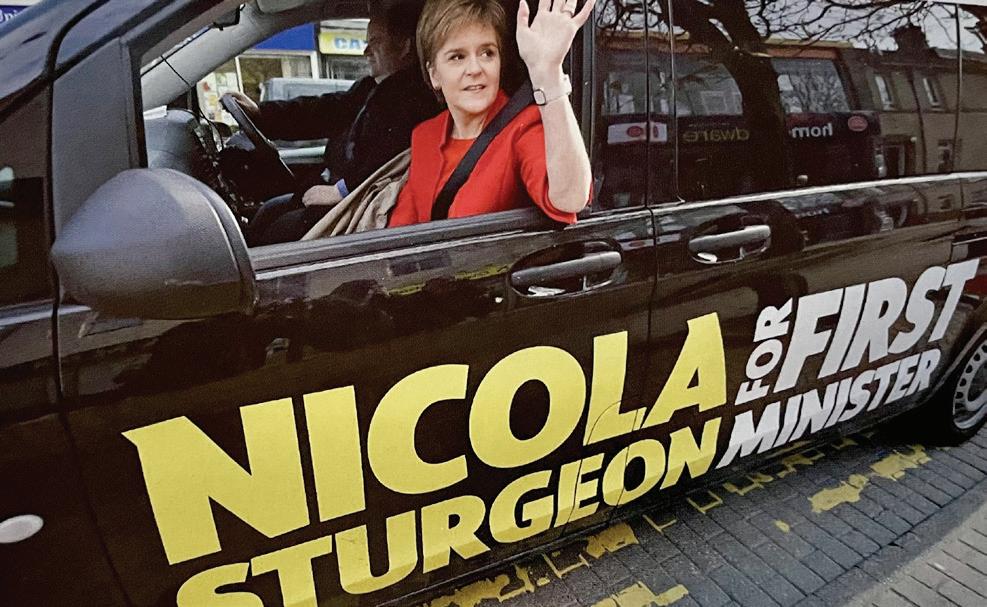
Describing the progress made by the SNP in the book, Nicola Sturgeon said, “We started winning, and kept winning, when we fixed the fundamentals”, that is the campaign for independence and representing the needs of the people in equal measure.
Nicola Sturgeon’s upbringing was ‘loving’ and ‘traditional’ for the time. She could not have wished for a better mum and dad. Her mother was elected as a local councillor in North Ayrshire.
She was very close to her paternal grandparents. Her gran Margaret supported Scottish independence and voted for the SNP before Nicola Sturgeon did. But politics rarely if ever featured in her house.
She writes in detail about her personal life and weaves that story in and out of her political life – they are inseparable.
She uses her influence and status to challenge misogyny and sexism and “the snobbery and condescension that conditions many working-class people who believe that power and influence are not for us”.
And the impact of this class prejudice is reflected throughout the book – and is defined by her as “imposter syndrome” – an acute lack of confidence and self-belief.
However, this did not stop her from using her sharp political instinct and wisdom to instil confidence on those around her, the Scottish people and minorities like the ethnic community and the LGBTQI and transgender community.
‘Frankly’ should be read by all those in Ireland at all levels involved in the independence movement for a new Ireland.
We all know that no two struggles are the same for a host of reasons. But Nicola’s story and her account about the rise of the SNP and its use of political institutions as a platform to promote independence is worthy of a close read.
Nicola Sturgeon may have left electoral politics but I suspect until Scotland achieves its independence she will be around to help bring about that life-long ambition.

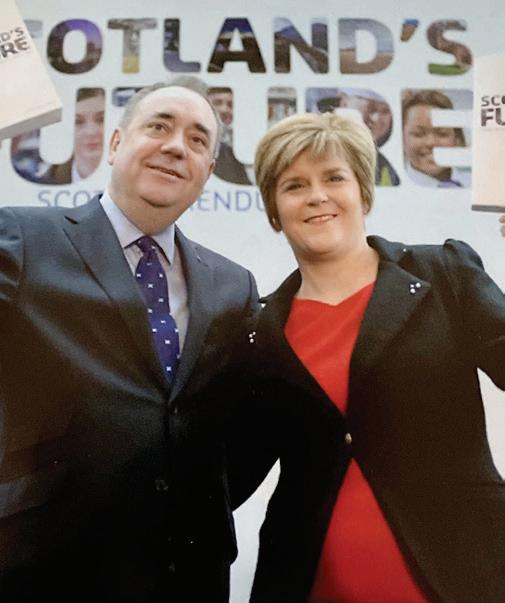
ANSWERS
Mícheál D Ó hUigínn
his birth (to avoid a fine for late registration) and Eamonn de Valera
for himself to become eligible to run for election